#i couldn't visualize it without an actual image
Explore tagged Tumblr posts
Text
Deliquent oc Adrien hcs + visuals!
— contains one nsfw hc!
Adrien who works out with how much you weigh. Anything involving weights he'll adjust them to your weight or higher because he wants to be able to hold and carry you with ease.
Adrien who has a rocky relationship with his parents but always talks about you to them in a good light — his parents love you because you're a good influence.
Adrien who always refers to you as his boyfriend even if you aren't actually dating him. Yet.
Adrien who overhears people talking behind your back and he has to resist doing something about it because he couldn't let anyone know about your "relationship" with him. So he stalks that person after class and makes sure to teach them a lesson.
Adrien who purposefully comes over to your house without an invitation just so he can breathe in your scent when he goes into your room. That explains why he always sleeps in your bed when he's over.
NSFW : Adrien who is in the middle of relieving his stress through masturbation, sees your text pop up on his phone, and now all he can think about is pounding into you. He can't even last a second when your face flashes in his head before he's a groaning mess. One day he'll send a video to you.

Visuals
I imagined him to be definitely bulky, tattoos, and slightly tan! I collected some photos through pintrest that I was like "that could be adrien" they aren't real images, if you don't like drawn face claims(?) then i'm sorry, feel free to find your own image that suits him, he's fictional after all!
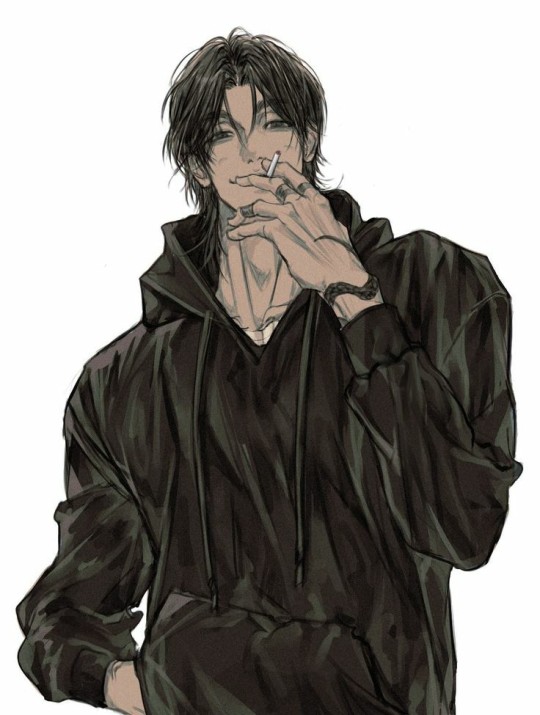
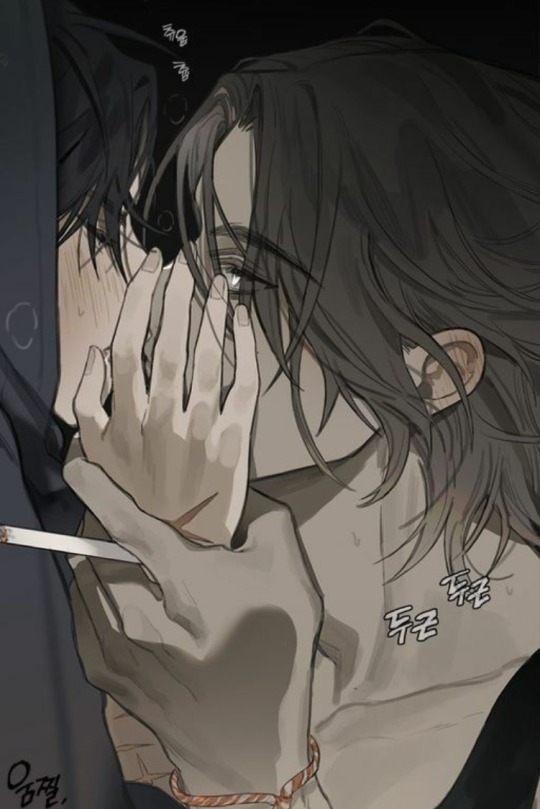
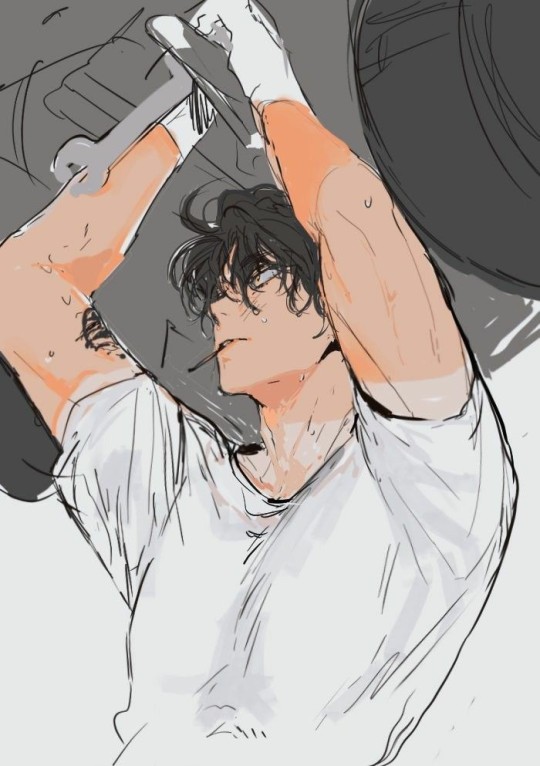
Im not too sure though! If you guys have some photos you wanna share with me my inbox is open w/ images ♡
Some texts I thought gave off Adrien:
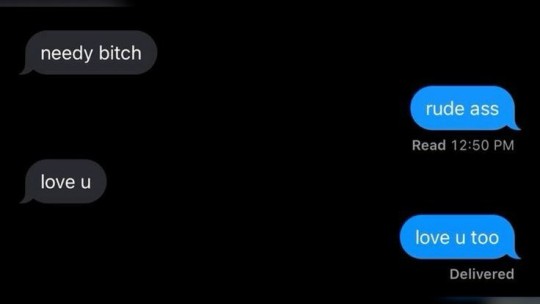
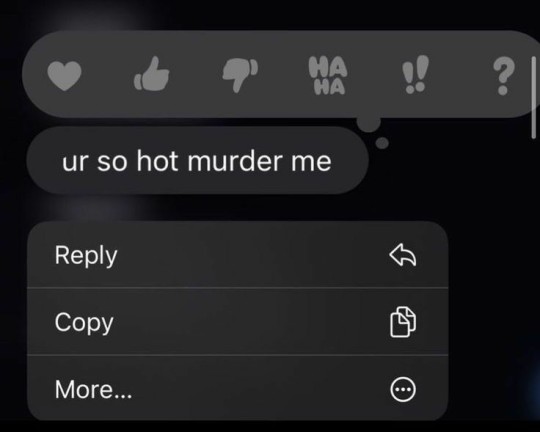
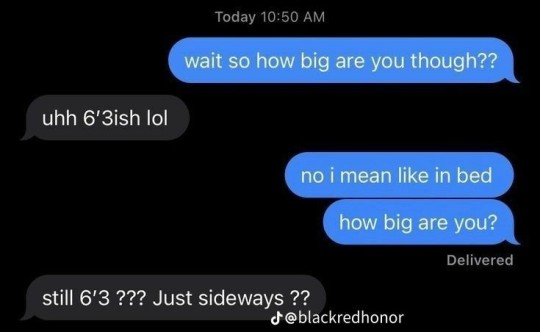
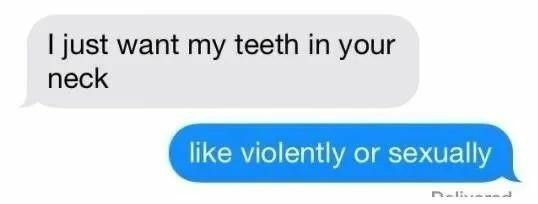
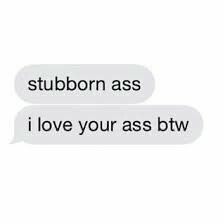
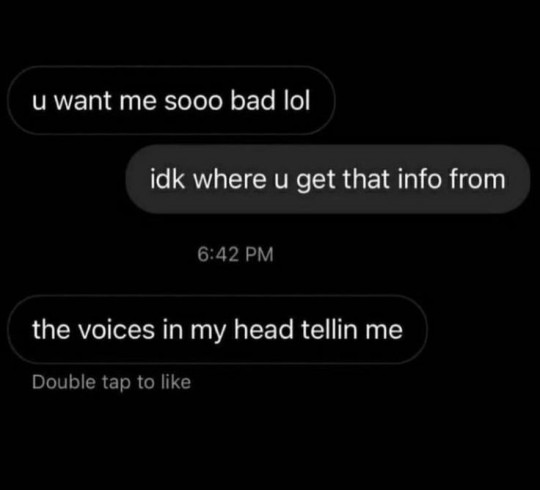

notes ,, this is a little filler post while i tackle my current Adrien fic
1K notes
·
View notes
Text
Hey Look At This Comic: Smut Peddler Presents Pitch Black
I can't remember how we got on the subject of the comics that my friends Iris Jay and Nero Villagallos O'Reilly did for an old Iron Circus april fools bit. maybe we were chatting about Megan Delyani's blank frame comic Spaces, which I wrote a whole review of last year, but it might just as easily have been talking about comic structure generally. cause we're huge nerds. being a huge nerd, I was all over the premise of the joke: a fake kickstarter for a Smut Peddler volume full of comics with all blacked out panels.
it's a great gag, a full webpage duping the Kickstarter layout, with a fun tongue in cheek explanation: comics don't leave enough up to the imagination, there aren't enough interpretive gaps for the reader, so to fix that Smut Peddler will publish a bunch of Pitch Black comics where YOU have to provide the visuals. Joke, maybe, but it lends credence to frame-focused models of comics reading: it's not the images that make something a comic, but the breakdown of page space into discrete units. So goes one theory, anyway. How do these pages fare without their images?

Lin Visel deploys a regular grid of long, thin columns, with a kind of horizontal capital at the top. The speech bubbles drive a lot of the action here and there's a sense of simultaneous movement across the bottom, with the bubbles breaking the panel borders at the top and the sound effects flowing into each other below. So, there's an interesting division between the upper strip, which is relatively subdued, a moment of reassurance that exists almost in its own zone before the rush of the bottom. And, as we'll see with a bunch of the others, in the absence of images the style of the text, the shape of the word balloons, and the font colors all become more crucial to conveying what's happening (sex, to be clear). That's already a lot going on with a series of black panels.

I love how Iris's comic bakes an explanation for the blacked out panels into its narrative. The apparently dominant character gloats that her streaming site won't let her actually display the brutal force-fem pegging she's giving to some shitty gamer bro. Sure enough, at the bottom of that panel there's a black and white video control interface and LIVE signal. Text alone and the design of the speech bubbles transforms the whole diegesis of that second panel, from the floating omniscient "camera" of the other panels to a webcam. Which is crazy because don't forget, there is no diegesis at all. It's all black!
There's so many great touches in this. I love the fact that the tongue in cheek panel containing the "guy's" internal monologue ("I can feel my epic skills draining away with every thrust... along with my masculinity!") is not just a second panel on the upper strip but an inset, separating out this moment of more intimate first person experience from the more remote view of implied fucking. And look at the flowers in the final orgasmic speech bubble! This is a total tangent but I feel like a lot of older attempts at structuralist comics decomposition wanted a firm line between the panel, the image, the characters, the speech bubbles, and so on. But comic elements can constantly interpenetrate, with the apparent domain of text becoming more complex graphical elements. Also, what a cute way to depict orgasming so hard you get turned into a girl. Head full of flowers. :)
It's incredible what you can achieve without breaking Tumblr's draconian terms of service at all.

Robin Tess offers a more straightfoward humorous panel, which lets me catch my breath after Iris's hot and heavy speech bubbles. Yet, this could have been a straightfoward 2 x 3 grid, couldn't it? 6 panels? Instead, this joke about over-engineered jargon names for what could just as easily have been called a "fuckmachine" (left delightfully up to the imagination) gets its core pacing from an irregular panel format. The premise is introduced in a big splashy full-strip panel at the top, the elaboration takes up the middle row, and then the bottom, in two equal panels, displays the two part punchline. I like the subtle way the middle row panels get progressively smaller. It increases the tension as we move toward the release of the punchlines, in a way that could be easily obscured by the panel contents if the page wasn't all blacked out in this way. Like Delyani's work, it makes me want to see notable comics blacked out. It could offer a whole new perspective on the medium's language.

Speaking of which, Nero uses a series of tall regular panels that suddenly POP into one that seems to squirt across the page, the other panels moved to allow for the white negative space to show off the irregular splash of the panel edge. This could be the silhouette of literal fluid, but I also like the idea of a frame that just has this kind of irregular energy. The comic structure itself becoming unruly and fluid to highlight a climax is a staple of many comic genres, but I'd say that I see it deployed most consistently by adult creators, who seem more willing to throw page literalism to the wind in order to achieve heightened expressivity. And once again we've got this escalation to a climactic panel. Typing this up I actually realized I don't have a specific idea of what I think the visual for these panels is or should be. Part of the excitement comes from filling in the blanks, to be sure, but that's true of any comic, which requires us to engage in closure to make sense of the transition from panel to panel. No, it's the drama of the reveal of the vibe plug one character apparently has been hiding, the invitation to intimacy, and finally the release, all achieved through dialogue physically arranged on the page. I don't think this would really make sense at all without the visuals that ARE there--the buzzing sound effect that moves across panel borders and is simultaneous to rather than sequentially arranged between lines of dialogue, and the incredibly suggestive final panel shape. Even without apparent visuals, this is visual storytelling.

Abby Howard wraps things up with the most abstract of the pieces, one that doesn't use frames at all but implies panel contents simply through the convention of word balloon tails. The result is a disorienting dark mass. It's hard to know what exactly is happening here and actually I'm having a hard time imagining what the last visual is "supposed" to be. It sort of is what it is: groping claw marks raking a black void. It's part of the april fool's joke, but it's a creepy one, and it feeds into the final joke of the page: that all this overthinking, all this trying to make sense of black panels, has worn you out, made you vulnerable to the Dark. Well, looking at everything I typed up here, I can't deny the inevitability of this end. Time to get in the maw!
Actually I think this end uncovers the close relationship that comics and hypertext narratives or more experimentally formatted texts have to one another: the space on the page becomes, itself, a signifying element and a way to direct the flow of the story. It's a shame that this is, I think, still considered a bit gimmicky in the realm of professional publishing and criticism. We have all these tools we've barely employed for storytelling, made far more accessible than in the days of having to manually set type!
Well, maybe it'll all have its day in the sun, or I suppose night in its new moon, soon enough. With an increasingly puritanical treatment of sexuality in society and on the internet, maybe we'll ALL have to black the action out of our comics and leave the frames to imply what we socially no longer want to see.
Pitch Black: Comics Code Authority approved!
you can read more reviews in the Hey Look At This Comic tag and support me on Patreon at least until they get my ass for being an adult writing about comics for other adults.
#Hey Look At This Comic#comics#iron circus comics#experimental comics#indie comics#webcomics#comic review
132 notes
·
View notes
Text
Intimate Photos.
Part I (+16!)
Involved: Itoshi Rin, Michael Kaiser, Yo Hiori, Seishiro Nagi
Type of relationship: Courtship.
What is it like to send intimate photos with the Blue Lock guys?
ATTENTION!
• omniscient narrator
• this is a translation; it's written by me, but it's translated because I speak Spanish
____________________________________________

____________________________________________
Itoshi Rin!
It was already complicated to get Rin to send photos to Y/N, the first time it happened was when he met up with his teammates from the Neo-Egoist League, the P.X.G. At that moment, Rin sent a photo to Y/N, programmed for her to save. It was a full-body photo where Rin was leaning on a pole right next to a small cup from a cafeteria. On this cup, the name "Rinny" could be clearly seen. Due to the quality of the camera, Rin's clothing was clearly visible. He was already leaning on a pole, balancing his body with one foot. Rin was wearing black pants along with a white shirt that was rolled up so everyone could see the bracelet he had on his wrist, a nice detail he shared with Y/N.
Y/N wasn't even used to Rin sending her pictures, but she really liked this one, sending him a blue heart, responding to the message, Rin responded by writing "Nanase took the picture, I hope you like it", exciting Y/N.
Well, that was the first time Rin sent a photo of himself to his girlfriend, and he started doing it more frequently. He sent her photos of what he did during his trips for international matches, he sent her visuals of what he did, bought, or simply saw, pictures of himself going to training, pictures of himself, even shirtless ones.
He knew Y/N would go crazy for those photos.
Until unexpectedly, on one of his trips while staying at a hotel, he sent Y/N a message. It said, "Love, can you tell me what you're wearing?" It seemed like the most innocent message he'd ever sent his girlfriend. She sent him a simple photo of herself in a little skirt and a bra that seemed to barely cover the girl's breasts. Rin knows you just like to be comfortable around the house and wear those outfits.
Maybe it's just Itoshi's whim.
Rin thought it was on purpose. Why would she be like this? Then he remembered that it was actually really hot in Japan, unlike where he was in Spain. Rin, without realizing it, hardened completely at that moment. Seeing that image reminded him of all their sexual encounters, the girl's expressions when they had sex, her moans, how she begged for more, and her delightful pleasure.
Rin didn't know what to do in this situation. It wasn't the first time it had happened, but now he had the opportunity to send her a "Look how I am" and send him a picture of his erect member, or simply let it go. What would Itoshi Rin choose now? Of course, the first option was the "best" he could think of: send her a picture and see what happened. He planned to masturbate only if Y/N asked him to. Then, he tapped the option marked with a bed of photos, pulled down his pants and boxers, took the photo, and sent it, followed by a message: "Look how you turned me on, Y/N." Rin smiled smugly. For Y/N's part, she couldn't believe that Rin, her boyfriend, had sent her a picture like that, instantly responding with a "Huh?" It was exactly what best represented his emotion. Rin replied again, "What do I do with this?" He checked the text, adding another new photo in which it was now his hand holding his member.
Y/N, still somewhat confused, replied, "Touch yourself, please." Y/N was embarrassed to ask her boyfriend this, but her fetishistic mind won. Rin asked again, "Do you want a video?" This undoubtedly fueled Itoshi's ego. Y/N answered, confirming his question, obtaining videos of her boyfriend masturbating and climaxing, while his moans and the name of his beloved, Y/N, could be heard in the background.
Indeed, Y/N would send Rin scantily clad photos more often, whether intentionally or not...
____________________________________________

____________________________________________
Michael Kaiser!
Kaiser, one of the most selfish men with the greatest desire to feel superior to everyone, used to always send photos to Y/N. Although he was a first-class selfish man, with his girlfriend he seemed like a first-class sweetheart, completely opposite to what was seen on the court. He didn't like taking photos with his fans or being photographed if those photos wouldn't be seen by Y/N. He found it annoying and unnecessary for anyone other than his girlfriend to see him.
But even so, his ego led him, one simple afternoon, when he was at home texting with his girlfriend before he went into the shower, to send her an almost full-body photo. You could see his well-worked physique, the blue rose tattoo running down his arm opposite the one taking the photo. He was wearing a towel covering his member, but you could see the line on his pelvis that indicated the path to his member.
Y/N tried to return the photo, taking a similar one, but unlike Kaiser's, she was wearing a bluish dress, a mixture almost identical to if you put together the colors of Kaiser's blue rose tattoo and his hair color. This dress left Y/N's body fixed, two circles could be seen on her resonant chest, her breasts. Looking down from the photo, you could see her wide waist, her thighs, not so horrible but desirable for any guy, and her arms, an important fact, Y/N also defined her body, that is, the training in her body could be observed but not in so many features. Kaiser knew that Y/N had returned the same coin, he knew that she was going to try to battle his ego with more ego, but this no longer mattered to him, he began to touch himself, he passed his warm hand over his member, knowing himself, taking it between his hands and massaging it from a short distance, when he felt ready he increased the speed and the range that he wanted his hand to reach, sinking into pleasure, increasing the speed to his liking knowing that whenever he wanted he could reach climax, doing that as quickly as possible, thinking about Y/N, her dress, every part of her that stood out and her beautiful body, finally, he came.
Kaiser's shot was stopped by his own hand. He was still holding his phone on the bathroom sink, staring at the photo, white liquid dripping down his hand. He let it rest where it came from. He took his phone back with the hand he'd used to masturbate and took a picture of his seed on it, adding, "Look what you make me do, Y/N," to the photo.
Y/N replied, "That's what I wanted to achieve, Kai," giving him her cute nickname in a not-so-cute situation.
____________________________________________

____________________________________________
Yo Hiori!
Hiori is a very affectionate and respectful boyfriend. He would never think of touching his treasure, Y/N, inappropriately, only when she wants or needs it, or even when the desire is mutual. Hiori agrees to unleash his most hormonal side, provoked by Y/N, obviously.
But even so, Hiori used to send pictures to Y/N. She saw it as a tender gesture and also a sign of trust. He would show her some new game he was about to try out, send her a short video of himself playing soccer with Kurona or Isagi, but nothing out of place, or at least not until Y/N asks him to.
"Yiorii, please send me pictures," Y/N begged. Yiori was a nickname Y/N gave her boyfriend; it was the union between Hiori and Yo, Yiori, changing the H to a Y.
Hiori didn't give up when Y/N begged or asked for something, he was beyond help. He was shirtless, wearing his athletic shorts, playing video games. He turned around so the screen was in the background and himself was the center, raising the camera so everything could be seen. Y/N, on the other side of the screen, smiled and blushed slightly at the photo. Hiori was wearing headphones around his neck. Y/N truly saw how beautiful he was, not to mention his defined physique; he was totally unique.
"You look so cute, Yiori. Show me more," Y/N added after seeing the photo, adding a two-heart emoji (💕).
Hiori, somewhat submissive but happy, sent her more photos of the same style but with different angles and poses, each time more attractive to Y/N, who, in an involuntary act, not at all intended for him and her, was as unreal as it was real. Something like mixing sweet with salt.
Y/N took off her shirt, lifted her bra, and took a picture, which she simply sent. When Hiori saw the photo, he was surprised, but not at all displeased. It was an odd photo to send between them, but Y/N could defend herself by saying that Hiori was extremely attractive and that her beauty led her to "sin." Perhaps the surprising thing was that Hiori joined in, getting up from his chair and standing near the three-quarter-length mirror that remained vertically on the floor, leaning against the wall. Hiori reached under his sports shorts and pulled them down, pulling his boxers down a bit to get the image he wanted, revealing the line of his boxer shorts elastic next to the branding imprinted on it, next to the end of his pelvic line, getting closer and closer.
Finally he achieved his visual goal, he took his phone while maintaining the pose, opened his girlfriend's chat and was about to take the picture, placing the phone sideways, showing his smile and his light blue hair next to his arm passing behind his head, hardening his body and leaving the result of his triceps work totally appreciated, which were perfectly marked, as well as a bulge that came out of his shots, which could be seen by the pose he was handling.
"And that lump, Yiori?" Y/N texted, and Hiori responded somewhat embarrassed, excusing himself by saying he would "calm down" the situation, apologizing.
Hiori isn't the best at taking intimate photos, but in person, he's actually very good.
____________________________________________

____________________________________________
Seishiro Nagi
Nagi spent all day on his phone, playing video games, or just talking to his girlfriend, Y/N.
Nagi didn't usually send photos to Y/N, but Y/N did take photos of him. Even so, it was difficult for him to take a photo, even though he usually sent her photos of Choki, Nagi's scissor cactus.
So, Nagi rarely sent photos of himself to Y/N, and when he did, Y/N flattered Nagi as much as possible, his beauty was prominent, and he never tired of emphasizing it.
And yet, Nagi would never send such a private photo to Y/N. The most naked he's ever been in a photo for Y/N is shirtless, lying on his bed, with Choki in the window frame.
That's Nagi's limit when it comes to photography, not because he simply doesn't want to, but because his laziness overwhelms him.
____________________________________________
a/n : This is the first part!
I hope to upload the next parts soon.
! credits to me, @ii-shiro .
#bllk#blue lock#blue lock fandom#itoshi rin#michael kaiser#nagi seishiro#bllk x yn#blue lock anime#yo hiori#bllk rin#bllk smut#bllk nagi#bllk x reader#bllk x you#bllk kaiser#blue lock fic#michael kaiser x you#nagi seishiro x you#rin itoshi#rin itoshi x reader#smut
144 notes
·
View notes
Text
Finally, I am happy to present to you my ...
EPIC: THE MUSICAL | ACT I [Character Design project]
I have been working on these for a long time and I am very happy with how these turned out. I am a huge fan of visual character design and I simply needed to do a full lineup.
Act II will follow shortly (it is all done except for Ithaca Saga, which I will add as soon as it drops.) Please enjoy, and read below for some thoughts and background on some of my design choices!
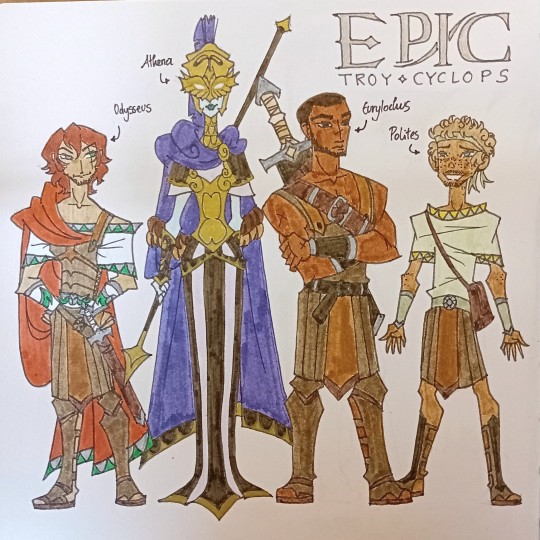
TROY | CYCLOPS ft. Odysseus, Athena, Eurylochus, and Polites
With Odysseus, I really wanted to emphasize his free spirit in this era and mark him as Athena's warrior, so I gave him a special belt and some armbands that represent her (this was inspired by some of @mircsy's work). He also has heterochromia; his left eye is green, representing his cunning, wisdom, and spirit; his right eye is gray, representing his ruthlessness and warrior side.
I simply love Athena in purple/gold. Her mask is a symbol of her invulnerability and comes off only during "My Goodbye" when Odysseus tells her that she's alone. Her cape can also transform into wings, and her eyes are actually golden without the mask.
I had to give Eurylochus his large anime sword (it's just as heavy as it looks but he likes it that way because that means no one besides him is strong enough to wield it ... I imagine Eurylochus can bench press at least Odysseus' and Polites' weights combined. He and Polites are also wearing variants of Odysseus' armor, indicating that they belong to the same army.
Listen, I can vibe with Eurylochus' giant sword but I draw the line at Polites with glasses, sorry. He still gets the hairband, of course. He's also dressed more casually, and without a weapon, because of his pacifistic outlook. He's the physically weakest among the trio by far but also still an inch taller than Odysseus (it's fine, Odysseus is still like 5'10, his friends are just all so freaking tall...)
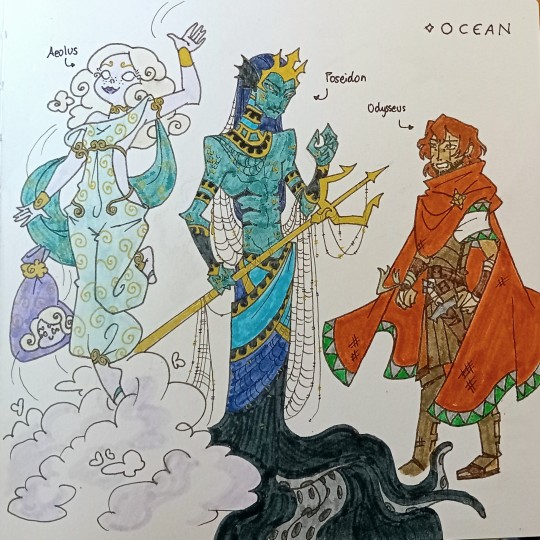
OCEAN ft. Aeolus, Poseidon, and Odysseus
Not gonna lie, I LOVED designing Aeolus' outfit. She's playful and mischievous and loves to hang out in the clouds all day; her outfit is probably made out of clouds let's be real. Also yes, her image on the windbag moves to make cheeky faces.
Poseidon I cannot imagine without tentacles anymore thanks to @gigizetz's "Ruthlessness", idk it just fits him so well. He definitely got all dressed up to go and sink Odysseus' fleet that day, he has a reputation, you know? And he just likes the shiny gold and accessories; the ocean is full of them so why wouldn't he?
Edit: I actually updated this design somewhat significantly; if you're interested in the current one, check here! He still has a tentacle/monster form, but it's not his only one.
Since breaking up with Athena, Odysseus lost her belt and armbands. He's still wearing her brooch because he couldn't bring himself to fully throw that away as well yet. Polites' hairband around his wrist reminds him of what he's fighting for and what to live by ... for now (Poseidon is about to ruin this man's whole career...)
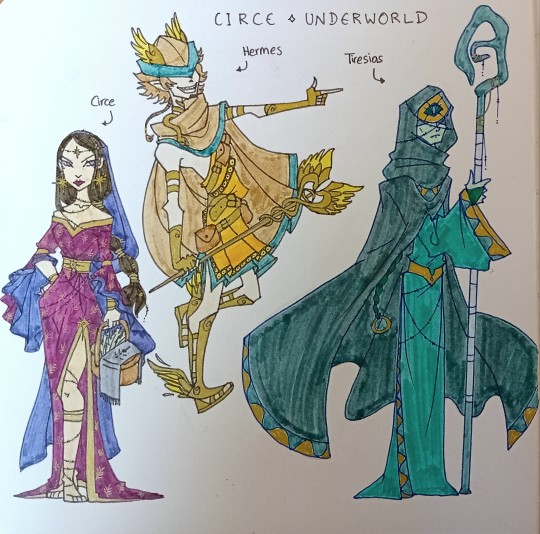
CIRCE | UNDERWORLD ft. Circe, Hermes, and Tiresias
I wanted to give Circe the "witch" vibe while putting a Greek spin on it and I actually adore her design. She seems both immortally youthful (something I aim for with all my god designs) and motherly. There she was, gathering some herbs when a bunch of strangers crash onto her island ... Oh well, at least this man was a good man this time.
Hermes is kind of just Hermes. I wanted to keep him shaded, a bit impish, and definitely up to no good. He's wearing the contrasting colors on purpose, by the way. And yes, his hat can fly on its own ... But for it to do that he'd have to actually be willing to show his face which he seldom does unless he really trusts you.
Tiresias is a soul, so he has the same kind of ageless youth as all my gods (something that goes for souls of dead people too, since I like to think they get to appear at whatever age they want after death.) He's looking a bit regal since he's a prophet, so I imagine regarded highly, even in the Underworld. Instead of the blindfold, his hood covers his face, adorned with a symbolic eye to identify him and his skill.
***
Well, that's it for ACT I, friends, I hope you liked these! I will upload ACT II asap. Please comment and/or tell me your thoughts about my designs! And feel free to ask any questions you may have! I would love to talk more about these.
#epic musical#epic the musical#epic the musical fanart#own art#epic odysseus#epic eurylochus#epic polites#epic poseidon#epic circe#epic athena#epic zeus#epic hermes#epic scylla#epic aeolus#epic tiresias#epic the troy saga#epic the cyclops saga#epic the ocean saga#epic the circe saga#epic the underworld saga#jorge rivera herrans#epic fanart#epic art
231 notes
·
View notes
Text
why Aurora's art is genius
It's break for me, and I've been meaning to sit down and read the Aurora webcomic (https://comicaurora.com/, @comicaurora on Tumblr) for quite a bit. So I did that over the last few days.
And… y'know. I can't actually say "I should've read this earlier," because otherwise I would've been up at 2:30-3am when I had responsibilities in the morning and I couldn't have properly enjoyed it, but. Holy shit guys THIS COMIC.
I intended to just do a generalized "hello this is all the things I love about this story," and I wrote a paragraph or two about art style. …and then another. And another. And I realized I needed to actually reference things so I would stop being too vague. I was reading the comic on my tablet or phone, because I wanted to stay curled up in my chair, but I type at a big monitor and so I saw more details… aaaaaand it turned into its own giant-ass post.
SO. Enjoy a few thousand words of me nerding out about this insanely cool art style and how fucking gorgeous this comic is? (There are screenshots, I promise it isn't just a wall of text.) In my defense, I just spent two semesters in graphic design classes focusing on the Adobe Suite, so… I get to be a nerd about pretty things…???
All positive feedback btw! No downers here. <3
---
I cannot emphasize enough how much I love the beautiful, simple stylistic method of drawing characters and figures. It is absolutely stunning and effortless and utterly graceful—it is so hard to capture the sheer beauty and fluidity of the human form in such a fashion. Even a simple outline of a character feels dynamic! It's gorgeous!
Though I do have a love-hate relationship with this, because my artistic side looks at that lovely simplicity, goes "I CAN DO THAT!" and then I sit down and go to the paper and realize that no, in fact, I cannot do that yet, because that simplicity is born of a hell of a lot of practice and understanding of bodies and actually is really hard to do. It's a very developed style that only looks simple because the artist knows what they're doing. The human body is hard to pull off, and this comic does so beautifully and makes it look effortless.
Also: line weight line weight line weight. It's especially important in simplified shapes and figures like this, and hoo boy is it used excellently. It's especially apparent the newer the pages get—I love watching that improvement over time—but with simpler figures and lines, you get nice light lines to emphasize both smaller details, like in the draping of clothing and the curls of hair—which, hello, yes—and thicker lines to emphasize bigger and more important details and silhouettes. It's the sort of thing that's essential to most illustrations, but I wanted to make a note of it because it's so vital to this art style.
THE USE OF LAYER BLENDING MODES OH MY GODS. (...uhhh, apologies to the people who don't know what that means, it's a digital art program thing? This article explains it for beginners.)
Bear with me, I just finished my second Photoshop course, I spent months and months working on projects with this shit so I see the genius use of Screen and/or its siblings (of which there are many—if I say "Screen" here, assume I mean the entire umbrella of Screen blending modes and possibly Overlay) and go nuts, but seriously it's so clever and also fucking gorgeous:
Firstly: the use of screened-on sound effect words over an action? A "CRACK" written over a branch and then put on Screen in glowy green so that it's subtle enough that it doesn't disrupt the visual flow, but still sticks out enough to make itself heard? Little "scritches" that are transparent where they're laid on without outlines to emphasize the sound without disrupting the underlying image? FUCK YES. I haven't seen this done literally anywhere else—granted, I haven't read a massive amount of comics, but I've read enough—and it is so clever and I adore it. Examples:


Secondly: The beautiful lighting effects. The curling leaves, all the magic, the various glowing eyes, the fog, the way it's all so vividly colored but doesn't burn your eyeballs out—a balance that's way harder to achieve than you'd think—and the soft glows around them, eeeee it's so pretty so pretty SO PRETTY. Not sure if some of these are Outer/Inner Glow/Shadow layer effects or if it's entirely hand-drawn, but major kudos either way; I can see the beautiful use of blending modes and I SALUTE YOUR GENIUS.
I keep looking at some of this stuff and go "is that a layer effect or is it done by hand?" Because you can make some similar things with the Satin layer effect in Photoshop (I don't know if other programs have this? I'm gonna have to find out since I won't have access to PS for much longer ;-;) that resembles some of the swirly inner bits on some of the lit effects, but I'm not sure if it is that or not. Or you could mask over textures? There's... many ways to do it.
If done by hand: oh my gods the patience, how. If done with layer effects: really clever work that knows how to stop said effects from looking wonky, because ugh those things get temperamental. If done with a layer of texture that's been masked over: very, very good masking work. No matter the method, pretty shimmers and swirly bits inside the bigger pretty swirls!
Next: The way color contrast is used! I will never be over the glowy green-on-black Primordial Life vibes when Alinua gets dropped into that… unconscious space?? with Life, for example, and the sharp contrast of vines and crack and branches and leaves against pitch black is just visually stunning. The way the roots sink into the ground and the three-dimensional sensation of it is particularly badass here:

Friggin. How does this imply depth like that. HOW. IT'S SO FREAKING COOL.
A huge point here is also color language and use! Everybody has their own particular shade, generally matching their eyes, magic, and personality, and I adore how this is used to make it clear who's talking or who's doing an action. That was especially apparent to me with Dainix and Falst in the caves—their colors are both fairly warm, but quite distinct, and I love how this clarifies who's doing what in panels with a lot of action from both of them. There is a particular bit that stuck out to me, so I dug up the panels (see this page and the following one https://comicaurora.com/aurora/1-20-30/):

(Gods it looks even prettier now that I put it against a plain background. Also, appreciation to Falst for managing a bridal-carry midair, damn.)
The way that their colors MERGE here! And the immense attention to detail in doing so—Dainix is higher up than Falst is in the first panel, so Dainix's orange fades into Falst's orange at the base. The next panel has gold up top and orange on bottom; we can't really tell in that panel where each of them are, but that's carried over to the next panel—
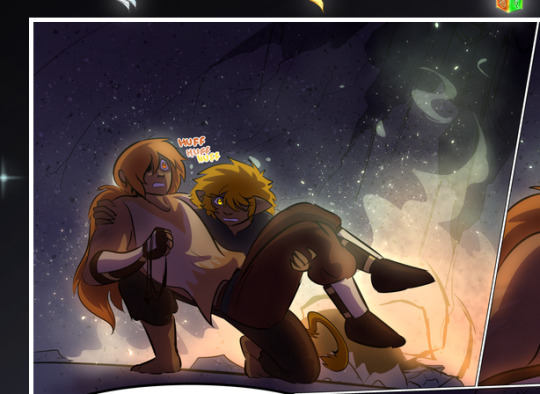
—where we now see that Falst's position is raised above Dainix's due to the way he's carrying him. (Points for continuity!) And, of course, we see the little "huffs" flowing from orange to yellow over their heads (where Dainix's head is higher than Falst's) to merge the sound of their breathing, which is absurdly clever because it emphasizes to the viewer how we hear two sets of huffing overlaying each other, not one. Absolutely brilliant.
(A few other notes of appreciation to that panel: beautiful glows around them, the sparks, the jagged silhouette of the spider legs, the lovely colors that have no right to make the area around a spider corpse that pretty, the excellent texturing on the cave walls plus perspective, the way Falst's movements imply Dainix's hefty weight, the natural posing of the characters, their on-point expressions that convey exactly how fuckin terrifying everything is right now, the slight glows to their eyes, and also they're just handsome boys <3)
Next up: Rain!!!! So well done! It's subtle enough that it never ever disrupts the impact of the focal point, but evident enough you can tell! And more importantly: THE MIST OFF THE CHARACTERS. Rain does this irl, it has that little vapor that comes off you and makes that little misty effect that plays with lighting, it's so cool-looking and here it's used to such pretty effect!
One of the panel captions says something about it blurring out all the injuries on the characters but like THAT AIN'T TOO BIG OF A PROBLEM when it gets across the environmental vibes, and also that'd be how it would look in real life too so like… outside viewer's angle is the same as the characters', mostly? my point is: that's the environment!!! that's the vibes, that's the feel! It gets it across and it does so in the most pretty way possible!
And another thing re: rain, the use of it to establish perspective, particularly in panels like this—

—where we can tell we're looking down at Tynan due to the perspective on the rain and where it's pointing. Excellent. (Also, kudos for looking down and emphasizing how Tynan's losing his advantage—lovely use of visual storytelling.)
Additionally, the misting here:
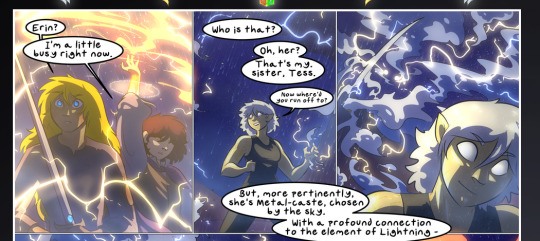
We see it most heavily in the leftmost panel, where it's quite foggy as you would expect in a rainstorm, especially in an environment with a lot of heat, but it's also lightly powdered on in the following two panels and tends to follow light sources, which makes complete sense given how light bounces off particles in the air.
A major point of strength in these too is a thorough understanding of lighting, like rim lighting, the various hues and shades, and an intricate understanding of how light bounces off surfaces even when they're in shadow (we'll see a faint glow in spots where characters are half in shadow, but that's how it would work in real life, because of how light bounces around).
Bringing some of these points together: the fluidity of the lines in magic, and the way simple glowing lines are used to emphasize motion and the magic itself, is deeply clever. I'm basically pulling at random from panels and there's definitely even better examples, but here's one (see this page https://comicaurora.com/aurora/1-16-33/):

First panel, listed in numbers because these build on each other:
The tension of the lines in Tess's magic here. This works on a couple levels: first, the way she's holding her fists, as if she's pulling a rope taut.
The way there's one primary line, emphasizing the rope feeling, accompanied by smaller ones.
The additional lines starbursting around her hands, to indicate the energy crackling in her hands and how she's doing a good bit more than just holding it. (That combined with the fists suggests some tension to the magic, too.) Also the variations in brightness, a feature you'll find in actual lightning. :D Additional kudos for how the lightning sparks and breaks off the metal of the sword.
A handful of miscellaneous notes on the second panel:
The reflection of the flames in Erin's typically dark blue eyes (which bears a remarkable resemblance to Dainix, incidentally—almost a thematic sort of parallel given Erin's using the same magic Dainix specializes in?)
The flowing of fabric in the wind and associated variation in the lineart
The way Erin's tattoos interact with the fire he's pulling to his hand
The way the rain overlays some of the fainter areas of fire (attention! to! detail! hell yeah!)
I could go on. I won't because this is a lot of writing already.
Third panel gets paragraphs, not bullets:
Erin's giant-ass "FWOOM" of fire there, and the way the outline of the word is puffy-edged and gradated to feel almost three-dimensional, plus once again using Screen or a variation on it so that the stars show up in the background. All this against that stunning plume of fire, which ripples and sparks so gorgeously, and the ending "om" of the onomatopoeia is emphasized incredibly brightly against that, adding to the punch of it and making the plume feel even brighter.
Also, once again, rain helping establish perspective, especially in how it's very angular in the left side of the panel and then slowly becomes more like a point to the right to indicate it's falling directly down on the viewer. Add in the bright, beautiful glow effects, fainter but no less important black lines beneath them to emphasize the sky and smoke and the like, and the stunningly beautiful lighting and gradated glows surrounding Erin plus the lightning jagging up at him from below, and you get one hell of an impactful panel right there. (And there is definitely more in there I could break down, this is just a lot already.)
And in general: The colors in this? Incredible. The blues and purples and oranges and golds compliment so well, and it's all so rich.
Like, seriously, just throughout the whole comic, the use of gradients, blending modes, color balance and hues, all the things, all the things, it makes for the most beautiful effects and glows and such a rich environment. There's a very distinct style to this comic in its simplified backgrounds (which I recognize are done partly because it's way easier and also backgrounds are so time-consuming dear gods but lemme say this) and vivid, smoothly drawn characters; the simplicity lets them come to the front and gives room for those beautiful, richly saturated focal points, letting the stylized designs of the magic and characters shine. The use of distinct silhouettes is insanely good. Honestly, complex backgrounds might run the risk of making everything too visually busy in this case. It's just, augh, so GORGEOUS.
Another bit, take a look at this page (https://comicaurora.com/aurora/1-15-28/):
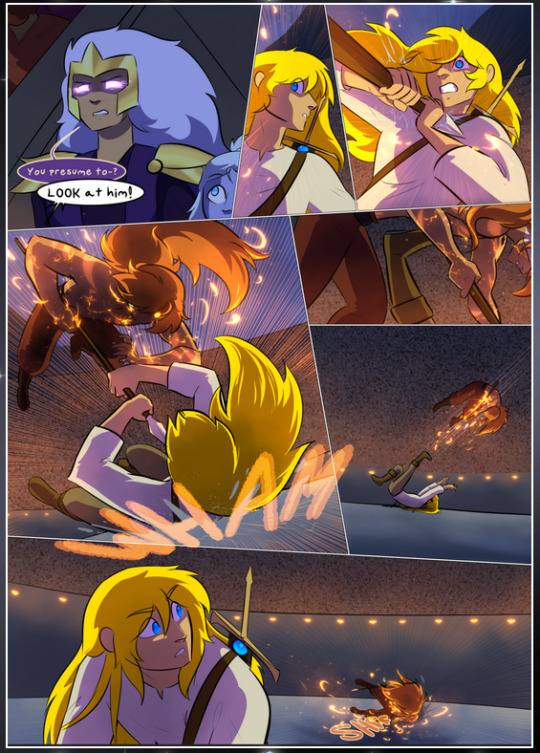
It's not quite as evident here as it is in the next page, but this one does some other fun things so I'm grabbing it. Points:
Once again, using different colors to represent different character actions. The "WHAM" of Kendal hitting the ground is caused by Dainix's force, so it's orange (and kudos for doubling the word over to add a shake effect). But we see blue layered underneath, which could be an environmental choice, but might also be because it's Kendal, whose color is blue.
And speaking off, take a look at the right-most panel on top, where Kendal grabs the spear: his motion is, again, illustrated in bright blue, versus the atmospheric screened-on orange lines that point toward him around the whole panel (I'm sure these have a name, I think they might be more of a manga thing though and the only experience I have in manga is reading a bit of Fullmetal Alchemist). Those lines emphasize the weight of the spear being shoved at him, and their color tells us Dainix is responsible for it.
One of my all-time favorite effects in this comic is the way cracks manifest across Dainix's body to represent when he starts to lose control; it is utterly gorgeous and wonderfully thematic. These are more evident in the page before and after this one, but you get a decent idea here. I love the way they glow softly, the way the fire juuuust flickers through at the start and then becomes more evident over time, and the cracks feel so realistic, like his skin is made of pottery. Additional points for how fire begins to creep into his hair.
A small detail that's generally consistent across the comic, but which I want to make note of here because you can see it pretty well: Kendal's eyes glow about the same as the jewel in his sword, mirroring his connection to said sword and calling back to how the jewel became Vash's eye temporarily and thus was once Kendal's eye. You can always see this connection (though there might be some spots where this also changes in a symbolic manner; I went through it quickly on the first time around, so I'll pay more attention when I inevitably reread this), where Kendal's always got that little shine of blue in his eyes the same as the jewel. It's a beautiful visual parallel that encourages the reader to subconsciously link them together, especially since the lines used to illustrate character movements typically mirror their eye color. It's an extension of Kendal.
Did I mention how ABSOLUTELY BEAUTIFUL the colors in this are?
Also, the mythological/legend-type scenes are illustrated in familiar style often used for that type of story, a simple and heavily symbolic two-dimensional cave-painting-like look. They are absolutely beautiful on many levels, employing simple, lovely gradients, slightly rougher and thicker lineart that is nonetheless smoothly beautiful, and working with clear silhouettes (a major strength of this art style, but also a strength in the comic overall). But in particular, I wanted to call attention to a particular thing (see this page https://comicaurora.com/aurora/1-12-4/):
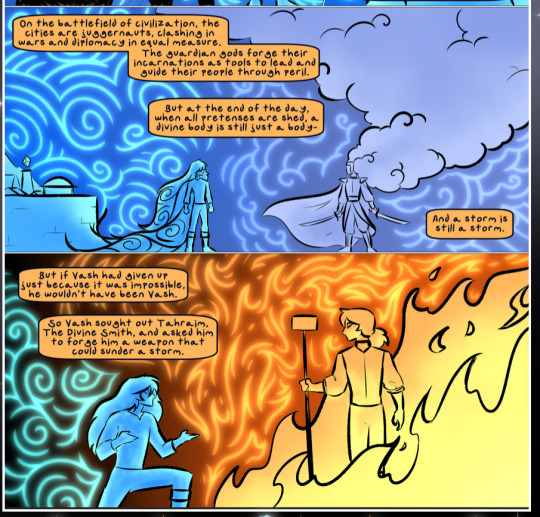
The flowing symbolic lineart surrounding each character. This is actually quite consistent across characters—see also Life's typical lines and how they curl:
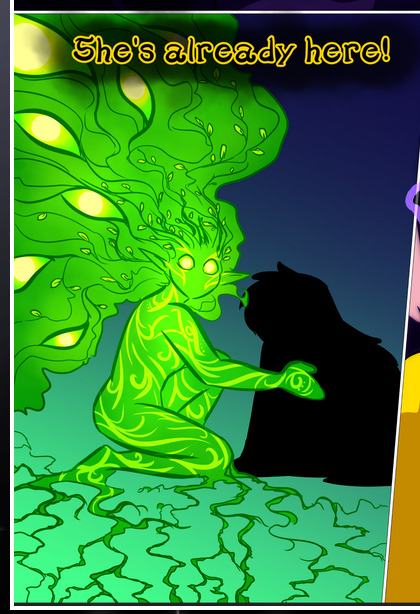
What's particularly interesting here is how these symbols are often similar, but not the same. Vash's lines are always smooth, clean curls, often playing off each other and echoing one another like ripples in a pond. You'd think they'd look too similar to Life's—but they don't. Life's curl like vines, and they remain connected; where one curve might echo another but exist entirely detached from each other in Vash's, Life's lines still remain wound together, because vines are continuous and don't float around. :P
Tahraim's are less continuous, often breaking up with significantly smaller bits and pieces floating around like—of course—sparks, and come to sharper points. These are also constants: we see the vines repeated over and over in Alinua's dreams of Life, and the echoing ripples of Vash are consistent wherever we encounter him. Kendal's dream of the ghost citizens of the city of Vash in the last few chapters is filled with these rippling, echoing patterns, to beautiful effect (https://comicaurora.com/aurora/1-20-14/):
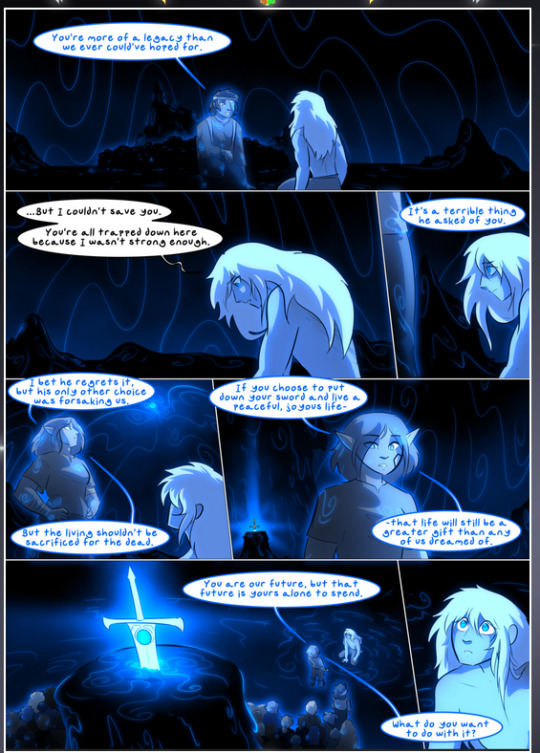
They ripple and spiral, often in long, sinuous curves, with smooth elegance. It reminds me a great deal of images of space and sine waves and the like. This establishes a definite feel to these different characters and their magic. And the thing is, that's not something that had to be done—the colors are good at emphasizing who's who. But it was done, and it adds a whole other dimension to the story. Whenever you're in a deity's domain, you know whose it is no matter the color.
Regarding that shape language, I wanted to make another note, too—Vash is sometimes described as chaotic and doing what he likes, which is interesting to me, because smooth, elegant curves and the color blue aren't generally associated with chaos. So while Vash might behave like that on the surface, I'm guessing he's got a lot more going on underneath; he's probably much more intentional in his actions than you'd think at a glance, and he is certainly quite caring with his city. The other thing is that this suits Kendal perfectly. He's a paragon character; he is kind, virtuous, and self-sacrificing, and often we see him aiming to calm others and keep them safe. Blue is such a good color for him. There is… probably more to this, but I'm not deep enough in yet to say.
And here's the thing: I'm only scratching the surface. There is so much more here I'm not covering (color palettes! outfits! character design! environment! the deities! so much more!) and a lot more I can't cover, because I don't have the experience; this is me as a hobbyist artist who happened to take a couple design classes because I wanted to. The art style to this comic is so clever and creative and beautiful, though, I just had to go off about it. <3
...brownie points for getting all the way down here? Have a cookie.
#aurora comic#aurora webcomic#comicaurora#art analysis#...I hope those are the right tags???#new fandom new tagging practices to learn ig#much thanks for something to read while I try to rest my wrists. carpal tunnel BAD. (ignore that I wrote this I've got braces ok it's fine)#anyway! I HAVE. MANY MORE THOUGHTS. ON THE STORY ITSELF. THIS LOVELY STORY#also a collection of reactions to a chunk of the comic before I hit the point where I was too busy reading to write anything down#idk how to format those tho#...yeet them into one post...???#eh I usually don't go off this much these days but this seems like a smaller tight-knit fandom so... might as well help build it?#and I have a little more time thanks to break so#oh yes also shoutout to my insanely awesome professor for teaching me all the technical stuff from this he is LOVELY#made an incredibly complex program into something comprehensible <3#synapse talks
806 notes
·
View notes
Text
Lost Details

I was going through the last chapters of JJK and I sat down to just take in the details Gege drew for Sukuna's final moments on earth when he gets ripped away from Megumi by Yuji.
In Blue you see Sukuna's additinal arms break and then fly off from Megumi's body because of Yuji's punch. It's brutal and deserves to be called "ripped off". It's what Megumi alluded to previously: separating a cursed object from a human is a delicate matter and Yuji might not be able to do it justice, hence the brutality that will look spectacular once it's animated.
(This botched creation of a cursed object is, in my opinion, the real reason why Sukuna died. Not because he was punched by Yuji and consequently killed by CE. The difference between those scenarios is that with one, Sukuna could be reborn as a curse like Naoya.)
In Red we see Sukuna's eye in both panels, as well as his fingers and everything attached to them framing the second panel. The lower part of this image is from Sukuna's point of view. Watching Megumi, the only person who can give Sukuna true freedom, fly away from him is the second-to-last thing Sukuna sees before dying.

On the double page next, we see how huge Sukuna's remnants actually are. That eye is most likely his enlarged eye on the right side of his face while all of what's left of him desperately reaches for Megumi to secure his freedom. In the second panel, he manages to grab Megumi but in the third he loses him again and burns down in flames.
The Eye, the Finger, and the Mouth: those are the things Sukuna consisted of for 2/3 of the manga. I don't mean that just visually and semi metaphorically; Sukuna's existence in the story is anchored on his fingers, they make him strong and ensure his millenia long survival. On their own though, Sukuna can't do anything with them.
His mouth and eye on the other hand, were always something he had absolute control over. Sukuna lived locked up in his mindscape before the first chapter, and then he was Yuji's prisoner afterwards. With his eye and mouth though he always had the freedom to see the world and interact with it as he pleased because Yuji couldn't prevent them from coming out.
In the first panel of that double page, we see Sukuna and what he is without Megumi: a mass of fingers, mouths and one eye. Without Megumi and his total subjugation, Sukuna doesn't have the freedom to be anything more than that. He can only be a person with Megumi.
In the third panel we see that without Yuji, Sukuna doesn't even have his life left but that fate he chooses on his own.

On the next page we see something interesting that many forget even with the previous page: BlobKuna is huge (at first). Gege thought of preserving the mass Sukuna consisted of even if that got turned into what he actually was: his mouths and eyes and fingers. What's also intersting is how the end result of his seperation from Megumi is drawn: It's ugly but also wet and Sukuna is only vaguely human shaped, which makes me think (with the themes of cursed wombs all around) of the abortion of a human foetus from its mother who kept it alive.
But that's a post for another day.
#jujutsu kaisen#jjk#sukuna#fushiguro megumi#yuji itadori#ryomen sukuna#meta#gege akutami#that other post will be about Megumi being Sukuna's victim#in a way that most likely will make that post age restricted#maybe
45 notes
·
View notes
Text



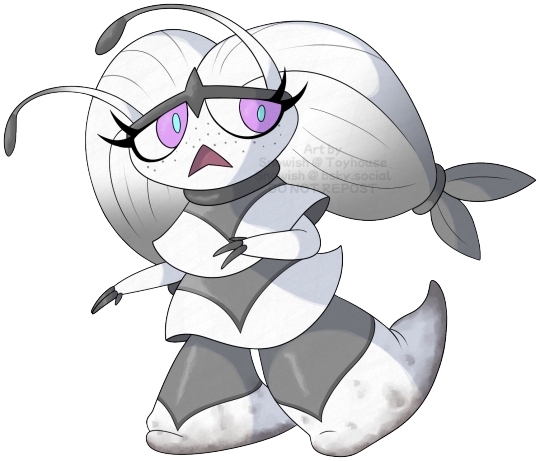

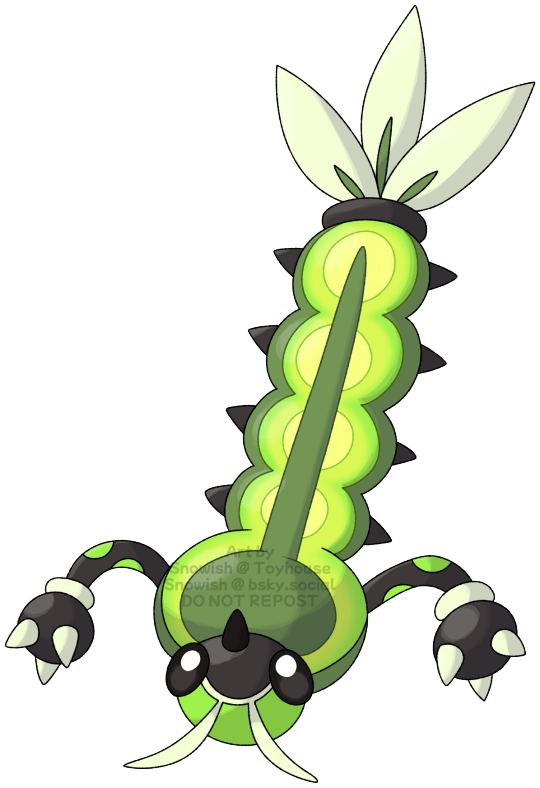
I rarely post art on here anymore (and don't expect it to be particularly Regular anymore), but I am pretty proud of these, so I figured I'd share them!
Doing a small project where I design pre-evos (or in the case of Kartana, an evo) for the Ultra Beasts! So here's the ones for Pheremosa and Buzzswole!
More info and rambling under the cut.
IMO, designing pre-evos is a little harder than evos, namely because you have to try and identify what would be the core 'theme' for the line, as well as dial back on the level of detail. And when the Pokemon you're working on are Ultra Beasts, who have their own specific design philosophy attached, it gets a lot more tricky.
I ran into a real roadblock with this regarding Kartana, because really my only option was a paper shuriken, but, well... I couldn't do that and keep the angular aspects of Kartana as well without it looking like A Certain Something, so rather than risk that, I went for an evo. You'll hopefully see it later.
For now, let's focus on these two.
Parfroach
Bug-type
Parfum (French, lit 'scent') + Roach
Evolves into Pheromosa after learning Double Kick
Dex 1: "A rather meek type that prefers to hide in the shadows of Ultra Space. Despite being a natural part of its body, the flaps of chiton over its legs seem too long, and are often sullied with dirt."
Dex 2: "This species is oddly concerned with its self-image, and seems desperate to make friends at times. As it grows, it learns how to make use of its pheromones to influence the moods of others."
The main design basis for this was the idea of an insecure, clumsy girl at an early school age. You know that trope in media where a character is considered 'ugly' or just undesirable in general when they're younger, but once an adult, suddenly they're considered attractive/suave/charismatic? That's the primary thing I was going for.
And a lot of that is influenced by societal views, childhood bullies, and a general insecurity in one's self-image, so the general demeanor of the species would probably be an Ultra Beast with inklings of an inferiority complex, avoiding others just on the assumption they will ridicule Parfroach for deeming them 'weird.'
It leads into quite an appropriate turnaround when it evolves into Pheromosa, having gained the looks it so desires, but now has no interest in emotional connections, instead using pheromones to manipulate others to get what it wants. Beautiful, but hollow, lacking the earnest heart of its previous form.
Musculicid
Fighting-type
Muscle + Culicidae (the family for mosquitoes)
Evolves into Buzzwole after learning Power-up Punch
Dex 1: "Though only a larva, this juvenile Ultra Beast is known for its scrappy nature. It lurks in cloudy pools of water and challenges all passerby to wrestle with it."
Dex 2: "It only saps the energy of those is can defeat in a proper fight. It eagerly awaits the day it can show off the strength it has accumulated."
This one is actually a lot more straight-forward than Parfroach, simply because I already had a strong visual in mind. Unlike roaches, mosquitos go through a larval stage, so their anatomical structure is considerably different.
Though heavily based on mosquitos, I made Fighting its type instead of bug for two main reasons: One, because Buzzwole and Pheromosa can be considered counterparts, while sharing the same type, so having their pre-evos be primarily different types was a small nod to that.
The second reason is because Buzzwole's core concept is more closely related to strength and combat. Pheromosa isn't to be underestimated with its violent kicks, sure, but if we take the anime into account, fighting is definitely more of a last resort for it.
As far as design goes, I more or less kept it close to an actual mosquito larva while also keeping aspects that stood out from Buzzwole. Another smaller detail is its overall shape resembles a thermometer, and while the levels of a thermometer rise with temperature, the visual of its own rising as it drained opponents was a good fit.
Though not expressed here in the art, I also have the idea that in a 3D model, the abdomen would have an effect similar to Paras' eyes, where that core is given priority, sort of the hammer in the idea that everything around it is more of a fluid than a solid texture.
Those are all the notes I have, so thanks for reading if you did! I dunno when I'll do the next ones, but I do have them all sketched out/designed, it's just a matter of taking the time to render them all lmao
31 notes
·
View notes
Text
a thought has occured to me (I know, shocking :P)
Lucanis barely sleeps during Veilguard. After the resolution of his questline, it seems like he never was good at sleeping (which I would love to know more about. like why is that exactly?? Neve's mind probably can't stop thinking, i get that. but with Lucanis who knows). But being afraid of Spite taking over in his sleep, he sleeps even less than before.
Lack of sleep has many disadvantages (for example not being able to kill the god you were supposed to :P), but one thing that tends to happen after a while is having hallucinations. Poor Spite already believes they are still in the Ossuary (bc Lucanis is there emotionally and for a spirit emotion is more real that the material world), but then his hostt's mind conjures random stuff, kinda like dreams, but no... this time it looks like these are in the material world. My man, Spite is already confused as fuck about our world, doing his best to make sense of it, and now he has to deal with the concept of a hallucination as well :'D
There was a post that suggested the idea that Lucanis might have Aphantasia (which I like for the sole reason that I have it too) that means that his mind cannot picture things visually. Like... picture an apple in your head. For some people it's almost like seeing an apple with all its details, for me it's just the concept of an apple with no image attached. My mind doesn't render the visual information into a picture.
So if he does have Aphantasia, then maybe there won't be random monsters, dead relatives and venatori captors walking up and down the Lighthouse, but you can still have auditory hallucinations. Or just see a shadow and believe that it's something else without actually seeing the hallucination. The mind is a powerful thing.
For example: there were four times total so far when I had visual hallucinations. All of them I find hilarious bc of my Aphantasia, and I just laughed at my brain afterwards "lol that's it? that's all you can do? you thought I'd fall for that?!?!?" I did. but still... There were two time when I was struggling to fall asleep bc my brain was too afraid and I suddenly saw a spider lowering itself from the ceiling in the moddile of my room. It was meant to be a realistic spider, you know the ones with the tiny body and long ass legs. And I watched it descend with my eyes wide open, and I noticed that not all its legs were attatched? And some parts of it looked lie they were "drawn wrong". and then it faded into nothing. So basically the maximum my brain could conjure was a bady made drawing of a small spider xD
Recently there was another one. I woke up half-asleep and couldn't move. And I saw that A BLACK TRIANGLE IS STANDING NEXT TO MY BED!!!! I was like oh no! Terrifying! Black triangle. STANDING. Right next to my bed!! And I was terrified and tried to make a sound or move, but couldn't for like 2 seconds. Then I fully woke up and I saw that the dreaded black triangle (wtf?? why would I be afraid of a black triangle???) was the corner of my cover that was in my line of sight above me. And then I realized that I was lying facing the wall, so even if there was someone standing next to my bed, I wouldn't have been able to see it. And I just started laughing at my own brain that the best sleep paralysis demon it could conjure was a black triangle aka the edge of my cover that I fully believed was standing there and it was a big confusing danger xD
So, yeah... Spite already has a difficult job figuring out wtf is going on in the material world, I'm 100% sure Lucanis' brain is NOT helping :'D
#lucanis dellamorte#spite dellamorte#spite dragon age#spite#lucanis#hallucinations#sleep deprivation#dragon age#dragon age veilguard#dav#dragon age the veilguard#datv#dragon age: veilguard#da:v#dragon age: the veilguard#da:tv
51 notes
·
View notes
Text
An interview with a shifter who has been “time leaping” since 2001
I found this website of an interview with a Japanese shifter known as Mr. Kanda. He figured out how to shift back in time when he was in middle school - he calls it “time leaping”.
The original website is in Japanese and can be found here.
Mr. Kanda was born in 1986, and around 2001 failed his high school entrance exam. Due to his intense regret, he shifted back in time to repeat middle school. He then made multiple time leaps repeating certain years of his life, studying different subjects in high school and pursuing different careers. At the time of the interview, he says he has lived about 70-80 years of life.
I translated some of the most interesting parts below.
Note: a Tulpa is a phenomenon that’s like an imaginary friend that actually becomes a sentient separate consciousness from you. It’s an entirely different rabbit hole, so you can just think of it as a dream character to understand his story.
My notes are written in [brackets].
.・。.・゜✭・.・✫・。.。.・゜✭・.・✫・゜・。.
Mr Kanda’s First Time Leap Story
Kanda: When I was meditating on my futon, I started to have a lucid dream.
At that time, Tulpa talked to me and said, "If you raise your clarity to the maximum in your dream, wouldn't it be possible to time leap, or even move around the world?" I tried it, but no matter how much I increased the clarity, it still felt like a dream.
So Tulpa said, "If you get absorbed in something you like, you won't be able to hear the voices around you, and your focus will gain momentum. You will eventually forget that you’re dreaming," so as a result of playing in the dreamworld, I spent about a week in a dream without knowing it.
At that time, I suddenly realized, "This is a dream", but I had already completely forgotten the feeling of the original world, and the dream world had become my new reality.
After thinking about why I didn't come back even though I realized it was a dream, the answer I came up with was, “It's because I completely lost my sense of the original world.”
To explain it another way, wouldn’t it be disorienting if I told you that the person you are right now is in a lucid dream of another person? That’s what it was like for me. My dream had actually become my reality, and I forgot about my old reality.
Q: What was the reason for your first time-leap?
Kanda: I think because something bad happened and I wanted to pretend it never happened.
The first time for me was probably a coincidence/accident. In fact, when I tried to do it again, I couldn't, so I started practicing with time leaps through lucid dreaming and meditation, and I got better at stabilizing and controlling them.
When people can’t do something, they hate it, but when they can do it, they love it. So once you succeed, even just once, your faith increases, and you know you can do it again!
Mr. Kanda’s Lucid Dreaming Method
Mr. Kanda recommends lucid dreams the most as a time-leap method. This is how he does it:
Before you go to sleep, first visualize in your head where you want to go. Then lie on your back and meditate. When you fall asleep, the images you were thinking about will run through your dreams. If you shift your consciousness to yourself in the dream, you will be able to act without being aware of what you are currently dreaming about.
In normal lucid dreaming, you become aware that you are dreaming right now [known as DILD or dream-induced lucid dream]. When trying to time-leap, the important thing is how much you can act in the dream in a way that is consistent with reality. He says it is important to “improve your clarity” to the point where it doesn’t feel like a dream anymore.
Mr. Kanda seems to be able to suddenly enter into a lucid dream from the moment he begins to sleep, [WILD - wake induced lucid dreaming] and he also teaches us how to do so:
First, relax.
In Kanda's case, he darkens his room 70 minutes before going to bed and drinks hot herbal tea. Adjust the temperature in the room to a comfortable level, then listen to some calming music. It's better to feel a little tired.
Once you get into bed, visualize and replay strong happy and positive memories in your mind. When you feel happy, close your eyes and calm down all at once and enter a meditative state.
Mr. Kanda recommends mindfulness meditation. Don't think about anything, just focus on the sound of your heart and breathing. When you successfully fall asleep from meditation, you are conscious but your body is asleep, and lucid dreaming begins.
Kanda meditates for 20 minutes every morning, not just when he wants to lucid dream. According to him, “conditioned reflexes” [creating habits] are important. By repeatedly performing a certain action, one eventually becomes able to enter that state without even trying.
Q: If the ‘you’ from another world were to time-leap to this world, what would happen to ‘you’ now?
Kanda: There seems to be a misunderstanding: there is only one consciousness.
Reality changes depending on where we place our consciousness in a world of infinite possibilities.
I do have consciousness in my other reality, but from the perspective of me in the current reality, it seems like I don't have consciousness.
In other words, my life in this other reality is as if it were controlled by a computer.
Of course, the same can be said for us. From the perspective of another reality’s consciousness, we too live our lives as if controlled by a computer.
In the end, even if consciousness from another reality shifts, the consciousness we see is always here. So no matter what they do, it has no effect on us.
273 notes
·
View notes
Text
DOGMA book: member interview translations
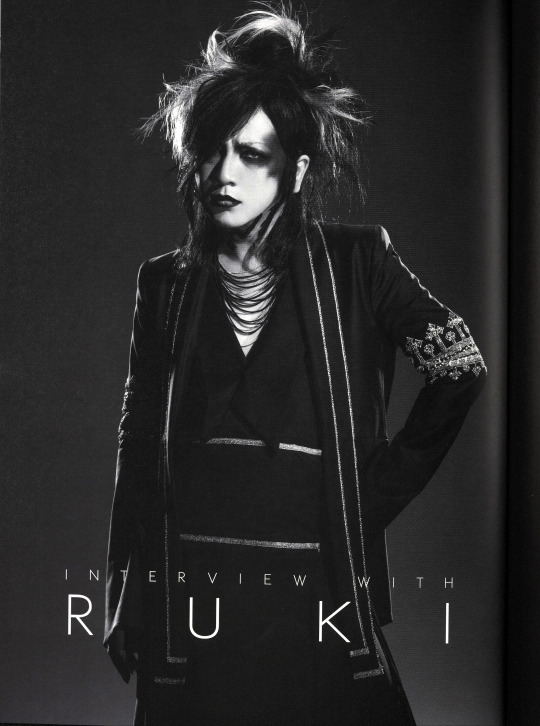
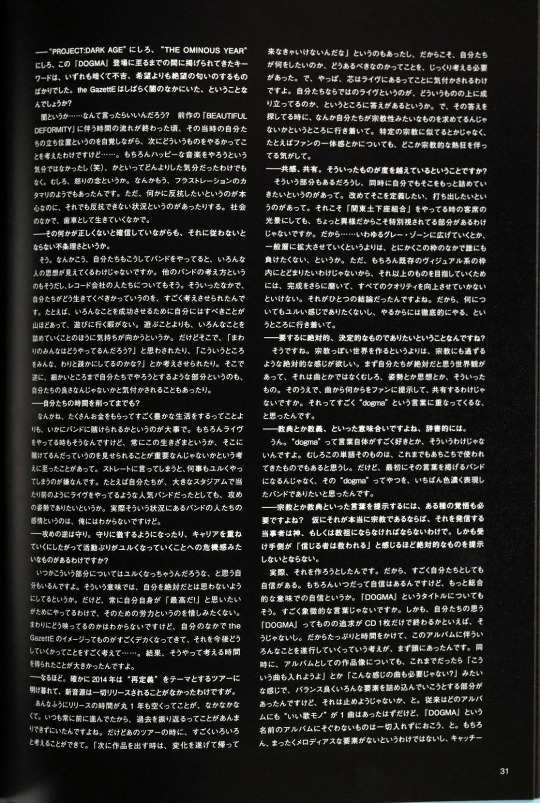
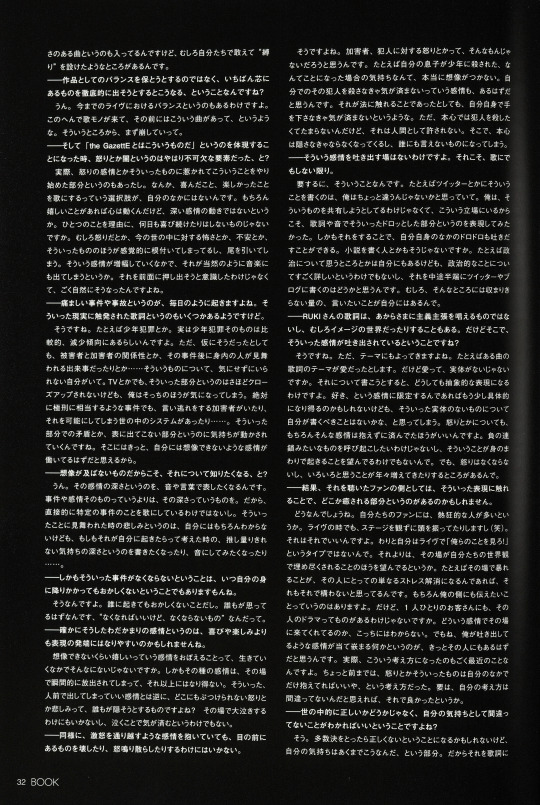
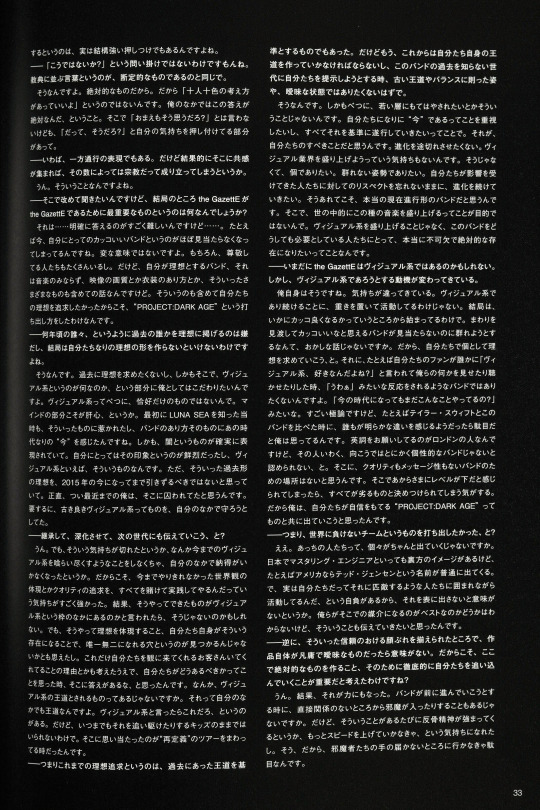
Interviewer: The keywords associated with "PROJECT: DARK AGE" and "THE OMINOUS YEAR," leading up to the release of "DOGMA," have all been gloomy, exuding a sense of despair rather than hope. Does this mean that the GazettE has been dwelling in darkness for a while?
Ruki: Rather than darkness...how should I put it? By the time the flow of time associated with our previous work "BEAUTIFUL DEFORMITY" had ended, we became aware of our standing and began thinking about what to do next. We weren't in the mood to create happy music (laughs), but we also weren't feeling gloomy. It was more like a sense of anger—a bundle of frustration. We are genuinely rebellious at heart, yet there were circumstances where we couldn't rebel, living as cogs in society.
Interviewer: You mean the absurdity of knowing that something is wrong but still having to comply with it?
Ruki: Exactly. As we continued our band activities, we encountered various people's thoughts—those of other bands and people from record companies. This made us reflect on how we should live. For instance, to achieve various successes, I had countless responsibilities and no time for leisure. My focus shifted more towards cramming in various tasks rather than having fun. But then, I'd wonder, "How does everyone else manage?" and consider if others might be neglecting such details. This made me realize that our meticulousness might actually be one of our strengths.
Interviewer: Even at the cost of sacrificing your own time?
Ruki: Instead of living a wealthy life with lots of money, it's more important for us to see how much we can dedicate to the band. Of course, this applies to when we are performing live as well, but it's crucial to show that we are betting everything on this lifestyle. I hate doing things half-heartedly. Even if we were a popular band performing in large stadiums, I'd still want to maintain an aggressive stance. Although I can't speak for the feelings of bands in that situation.
Interviewer: The opposite of aggressive is defensive. Do you have a sense of crisis about becoming complacent in your activities as your career progresses?
Ruki: There's a part of me that thinks we might eventually become more relaxed about these aspects. In that sense, I try not to think of myself as absolute. However, I do everything to feel that "we're the best!" and I don't want to spare any effort to achieve that. I don't know how others perceive it, but the image of the GazettE has grown significantly in my mind, and I have been thinking a lot about how to shape it in the future. Having time to think about it was very significant.
Interviewer: Indeed. In 2014, you were busy with a tour themed "redefinition," without releasing any new material.
Ruki: Having a whole year without a release was unusual. We were always moving forward and didn't have much time to look back. But during that tour, we could think about many things. There was a sense that when we released our next work, we had to come back changed. Therefore, we needed to think carefully about what we wanted to do and how we should be. Eventually, I realized that our core lies in live performances. The essence of our live shows is built upon something unique to us. While searching for that answer, I felt like we were seeking something akin to religiosity—not resembling any specific religion but perhaps related to the fervor of our fan unity.
Interviewer: Do you mean the degree of empathy and collective feeling beyond normal bounds?
Ruki: There might be some of that, but I also want to delve deeper into it. I wanted to redefine and present it anew. Even the sight of the audience during "Kantou Dogeza Kumiai" was extraordinary and special. So, instead of expanding into a gray zone or appealing to a broader general audience, we wanted to be unbeatable within our niche. But we don't intend to remain confined within the existing visual kei boundaries; we aim to elevate everything beyond that. That's one of our conclusions. We don't want to be lax about anything and strive to do everything thoroughly.
Interviewer: In other words, you want to be absolute and definitive.
Ruki: Yes. Rather than creating a religious-like world, we want an absolute feeling that also resonates with religious undertones. We have an absolute worldview that we believe in, and it involves attitudes and ideologies rather than just songs. We then present and share everything with our fans. That overlaps significantly with the word "dogma."
Interviewer: In the dictionary, it means doctrine or creed.
Ruki: I don't particularly love the word "dogma" itself. It's been used in many places before. But instead of being the first band to use the term, we wanted to be the band that expressed "dogma" most profoundly.
Interviewer: Using words like religion and doctrine requires a certain determination, doesn't it? If it were a real religion, the proponents would need to be gods or prophets, presenting something absolute for followers to believe in.
Ruki: We actually tried to create that. So, we're very confident in ourselves. Of course, we've always been confident, but this is more about a comprehensive confidence. The title "DOGMA" is very symbolic. And the pursuit of what we think "DOGMA" should be is not limited to just one CD. We planned to take our time to carry out various things associated with this album. At the same time, regarding the album's composition, we used to aim for a balanced inclusion of various elements, like "let's include this type of song" or "we need a song like this," but we decided to stop that. Previously, each album had at least one "good song," but for an album named "DOGMA," we decided not to include anything that didn't fit. Of course, it's not that there are no melodic or catchy elements at all...
Ruki: We have included songs with depth, but it's more like we deliberately set a 'rigidness' to it.
Interviewer: So, instead of maintaining balance within the work, you focused on thoroughly expressing the core element?
Ruki: Yes. There's always a balance in our live performances, like having a song come in at a certain point, or placing a specific type of song before another. We started by breaking away from that.
Interviewer: And when it came to embodying "this is what the GazettE is," anger and darkness were indeed essential elements?
Ruki: In reality, part of the reason we started doing this was because we were drawn to emotions like anger. Somehow, I don't have the option in myself to turn happy things or enjoyable things into songs. Of course, if something makes me happy, my heart moves, but it's not a deep emotional movement, you know? You don't stay joyful for days over one thing. Instead, anger, fear of the current world, and anxiety tend to root themselves deeply and linger. As these emotions amplify, they naturally emerge in the music, not because I consciously decided to push them to the forefront, but because it just naturally turned out that way.
Interviewer: There are tragic incidents and accidents occurring daily. Some of your lyrics seem inspired by such realities.
Ruki: Yes. For example, juvenile crime. Apparently, juvenile crime itself is relatively declining. However, regardless of that, there's a part of me that can't help but be concerned about things like the relationship between victims and perpetrators, or the incidents where family members are affected afterwards... Even though such aspects aren't often highlighted on TV, they catch my attention. Even in cases where there should absolutely be severe punishment, there are perpetrators who manage to evade responsibility, or there are systems in society that allow such things to happen... Such contradictions and hidden aspects move me emotionally because there are likely feelings involved that I can't even imagine.
Interviewer: Because you can't imagine them, you want to understand them?
Ruki: Yes. I want to express that depth of emotion through sound and words. It's not about the incident or the emotion itself, but the depth of it. Therefore, I'm not singing about specific incidents directly. While I can't understand the sadness faced by those affected, imagining it happening to me makes me want to express that depth of emotion and translate it into music.
Interviewer: And the fact that such incidents don't stop means it could happen to anyone, including yourself.
Ruki: Exactly. It can happen to anyone. Everyone must think, "It would be great if these things didn't happen, but they don't stop."
Interviewer: Indeed, those lingering feelings are easier to use as a starting point for expression compared to joy or pleasure.
Ruki: We rarely feel joy so intense it's hard to imagine in our lives. Such feelings are often momentarily released and don't go beyond that. On the opposite, anger and sadness that can't be directed anywhere are feelings everyone tries to hide. You can't burst into tears on the spot, and crying doesn't necessarily make you feel better.
Interviewer: Similarly, even if you harbor feelings of intense anger, you can't go around breaking things or shouting loudly.
Ruki: That's right. The anger towards the perpetrator or the criminal is not something trivial. For example, if my son were killed by a juvenile, I can't even imagine what kind of feelings I'd have.
I think there would be a feeling of needing to kill the perpetrator myself to feel satisfied. Even if that meant breaking the law, the feeling of needing to take matters into my own hands. However, while I might desperately want to kill the criminal in my heart, that's not something allowed for a human. Therefore, these dark feelings have to be hidden and can't be shared with anyone. Unless they're expressed through a song.
In short, that's what it is. For example, I don't think it's appropriate to write about such feelings on Twitter. I'm not trying to share those feelings with others; instead, from my position, I wanted to express those dark feelings through lyrics and sound. And by doing so, I can also expel the murkiness within myself. It's similar to how someone who writes novels might feel. For instance, I have my own thoughts on politics, but I'm not deeply knowledgeable about it, so I don't think it would be right to write about it half-heartedly on Twitter or a blog. Rather, I have a lot of things I want to say that wouldn't fit in such places.
Interviewer: RUKI-san's lyrics aren't explicitly advocating any particular ideology; sometimes it's about the world of imagery. However, that's where those emotions are being expelled, right?
Ruki: That's right. However, it depends on the theme as well. For example, if the theme of a song's lyrics is love. But love isn't tangible. When you try to write about it, it inevitably becomes abstract. If it's limited to the feeling of liking someone, it might become a bit more concrete, but I feel like there's nothing for me to write about such intangible things. As for anger, it's better not to have such feelings. I don't want to evoke a chain of negative events, and I don't wish for such things to happen around me. But anger doesn't go away, and I find myself feeling it more and more each year.
Interviewer: As a result, fans who listen to your music might find some form of healing through those expressions.
Ruki: I wonder about that. Many of our fans are quite enthusiastic. At our live shows, some don't even look at the stage and just headbang (laughs). That's fine. I'm not the type to shout, "Look at us!" during live performances. Rather, I prefer for the atmosphere to be filled with our worldview. For example, if someone releases their stress by going wild at our concerts, that's fine with me. Of course, I have things I want to convey too. But each fan has their own story. We don't know what emotions they bring with them to our concerts. But I think there's something in my emotions that resonates with each of them. I've only recently started thinking this way. Until a while ago, I thought it was enough to just keep the anger and such feelings within myself. As long as I felt my thinking wasn't wrong, that was enough.
Interviewer: It's not about being right by societal standards, but understanding that they are not wrong as your own feelings, right?
Ruki: Exactly. It might not be correct if you take a majority vote, but these are my feelings. So putting those feelings into lyrics is actually quite a forceful imposition.
Interviewer: It's not a question of "Isn't it like this?" It's more of a definitive statement, like words in a sacred text.
Ruki: That's right. It's because it's absolute. So it's not about "There are various ways of thinking." For me, this is the definitive answer. I'm not saying, "You should feel the same," but rather, "This is how it is for me."
Interviewer: So it's a one-way expression. But if it gathers enough empathy, it could even form a kind of religion.
Ruki: Yes, that's right.
Interviewer: So I'd like to ask again, in the end, what is the most important thing for the GazettE to be the GazettE?
Ruki: That's... it's really difficult to answer clearly... For example, right now, I don't find many bands that I think are cool. I don't mean that in a bad way. Of course, there are many people I respect. But the ideal band I envision, which includes not just the music but also things like the quality of the visuals and the way they dress, those elements combined, that's what I wanted to pursue, which led to the "PROJECT: DARK AGE" approach.
Interviewer: You don't want to idealize someone from the past, you have to create your own ideal form.
Ruki: That's right. I don't want to seek ideals in the past, and I want to focus on what visual kei really means. Visual kei isn't just about looks; it's about the mindset. When I first discovered LUNA SEA, I was drawn to those aspects and felt the "now" of that era in their band style. Moreover, they definitely expressed darkness. That impression was vivid for me, and that's what visual kei means to me. But I don't think we should cling to those past ideals in 2015. Honestly, until recently, I was probably trapped by that. I was trying to preserve the old-school visual kei within myself.
Interviewer: To inherit, deepen, and pass it on to the next generation?
Ruki: Yes. But I felt that I had to devour the visual kei of the past in order to be satisfied within myself. Therefore, I had a strong feeling of embodying the world view and pursuing quality that I hadn't been able to fully realize before. As a result, if you ask whether what we created falls within the bounds of visual kei, it might not. But by embodying those ideals and becoming such a presence ourselves, I felt we might find a unique position. Thinking about why so many people come to see us, I felt the answer was there. There's a traditional idea of what visual kei is supposed to be. For me, that's also the standard. When you think of visual kei, there's an image. But we can't remain kids chasing that image forever. This realization hit me while we were on the "Redefinition" tour.
Interviewer: So the pursuit of ideals so far was based on the classic model of the past. But now, you have to create your own ideal path and present yourselves to the generations who don't know your past. You can't stay in an old, balanced, or vague state.
Ruki: That's right. And it's not about wanting to be popular with younger audiences. We want to emphasize "now" in our own way and proceed with everything based on that. I think that's what we should be doing. We don't want to stop evolving. We're not trying to revitalize the visual kei industry. It's not about that; we want to be individuals. We want to maintain a stance of not blending in. We want to continue evolving without forgetting the respect we have for those who influenced us. Only by being like that can we be a truly current band. The goal is not to uplift this genre of music for the world. Instead, we want to become an indispensable and absolute presence for those who need us.
Interviewer: The GazettE might still be visual kei, but the motivation for being visual kei has changed.
Ruki: For me, it has. My feelings have changed. We're not focusing on continuing as visual kei. Ultimately, it started from wanting to be cool. Looking around, I don't see any bands that I think are cool, so it would be strange to try to blend in. So, we decided to seek our ideals as individuals. Also, when our fans show someone our music and say they like visual kei, I don't want the reaction to be "Wow." Are they still doing this in this era?" For example, and it's an extreme example, but if you compare us to Taylor Swift, I don't want there to be an obvious gap.
Our English lyrics are done by someone in London, and they say that over there, bands need to be unique to be recognized. If the quality and message of a band aren't apparent, there's no place for them. If it's clearly felt that our level is lower, everything will be dismissed as inferior. So we decided to go all out with "PROJECT: DARK AGE," creating something we could be confident in.
Interviewer: So you wanted to present a team that could compete with the world?
Ruki: Yes. Over there, each individual stands out. In Japan, mastering engineers are seen as behind-the-scenes, but in America, names like Ted Jensen are well-known. We work surrounded by people who are on par with them, and we want to show that. Whether we're the best intermediary for that is uncertain, but that's what we wanted to convey.
Interviewer: On the other hand, even if you have a reliable team, if the work itself is mediocre or vague, it means nothing. So, creating something absolute and pushing yourselves to the limit was crucial.
Ruki: Yes. As a result, it became our strength. When a band tries to move forward, obstacles sometimes come from unrelated places. But each time that happened, our rebellious spirit grew, making us want to speed up even more. We need to reach a place where those obstacles are no longer a concern.
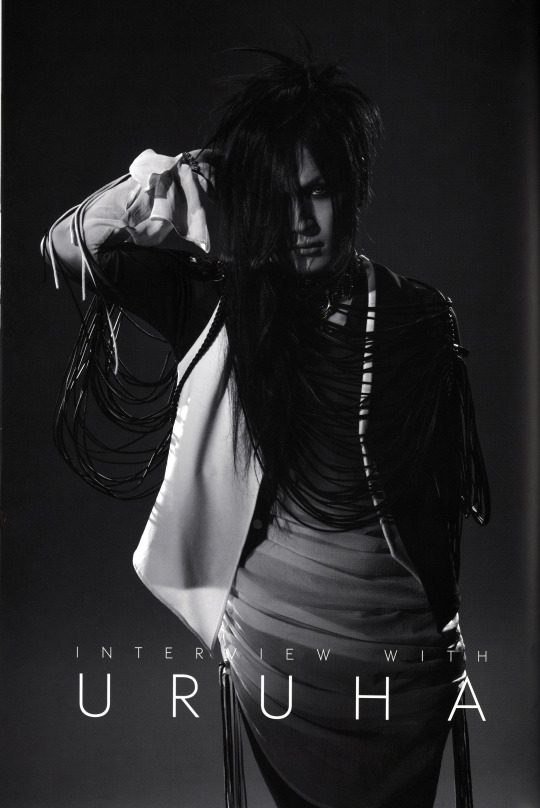
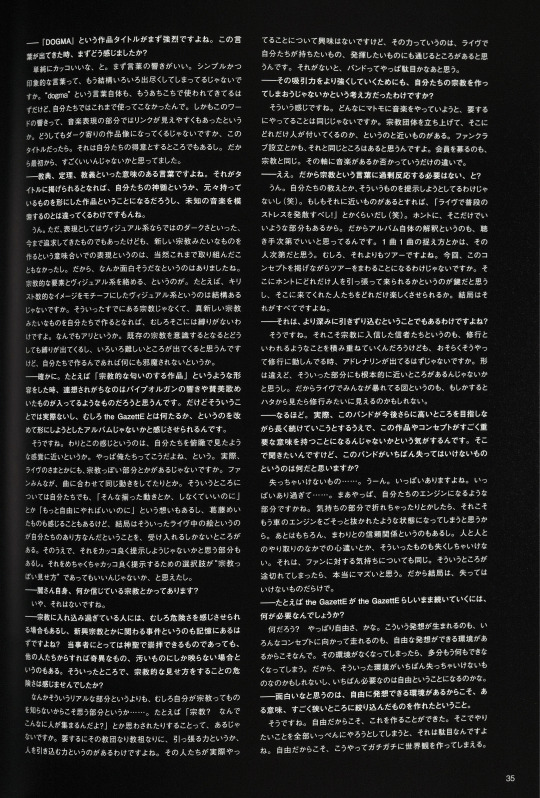
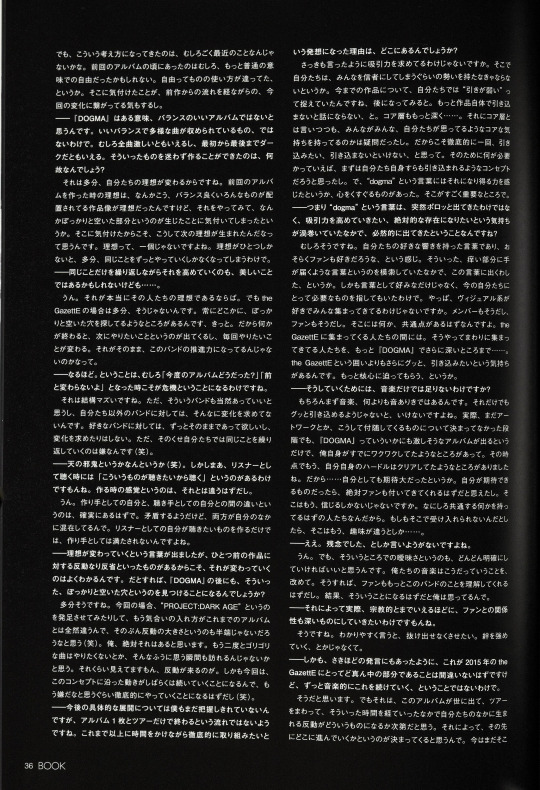
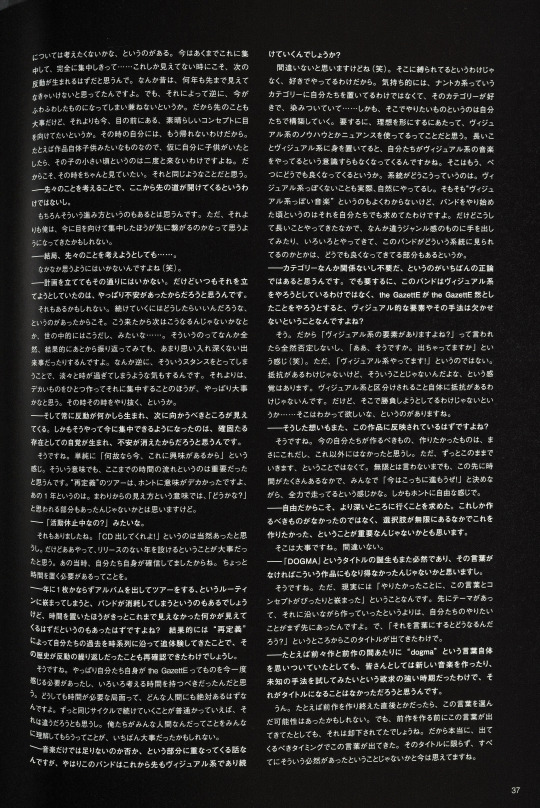
Interviewer: The title of your work "DOGMA" is quite striking. How did you feel when you first heard it?
Uruha: I simply thought it was cool. First of all, the sound of the word is good. Simple and impactful words have mostly already been used, right? Although the word "dogma" itself has already been used in many places, we hadn't used it before. The sound of this word links well with musical expression. If we use this title, the work inevitably has a darker tone. That aligns with our strengths. So, from the start, I thought it was a great idea.
Interviewer: It's a word that means creed, doctrine, or principle. Having it as a title implies that the work embodies your essence or what you've always had, rather than exploring unknown music.
Uruha: Yes. The darkness typical of visual kei that we've always pursued is part of it, but expressing the creation of a new religion is something we hadn't tackled before. So, it seemed interesting. Combining religious elements with visual kei. For example, there are quite a few visual kei bands that use Christian imagery as a motif. Instead of an existing religion, creating a brand-new one ourselves has a certain freedom. There are no constraints. If we were to be conscious of an existing religion, there would be limitations and difficulties, but if we create it ourselves, nothing gets in the way.
Interviewer: Indeed. When you describe a work as having a "religious feel," people might think of pipe organ sounds or hymn-like elements. But that's not the case here. Rather, it's an album that redefines what the GazettE is all about.
Uruha: Yes. It's like looking at ourselves from a bird's eye view. It's like, "Yeah, this is who we are." Even at our live shows, there are elements that seem religious. All the fans moving in unison with the music. Sometimes we feel, "You don't have to move like that," or "You could be more free." We feel a bit conflicted about it, but ultimately, we have to accept that this is our way. We think, "Let's present it in a cool way." So, choosing a "religious" presentation was one of the options to make it really cool.
Interviewer: Do you personally follow any religion?
Uruha: No, I don't.
Interviewer: For people who are overly devoted to religion, it can sometimes seem dangerous. We all remember incidents related to new religious movements. For the followers, it's sacred and worship-worthy, but for others, it can appear strange or dirty. Didn't you feel any danger in presenting things in a religious manner?
Uruha: Rather than those real aspects, it’s more about my own perspective since I don't really know much about religion. For example, "Why do so many people gather for this?" It's the pulling power of the sect or the leader. That power to attract people is something we want to have and show during our live performances. Without it, any band would be hopeless.
Interviewer: So, the idea was to create your own religion to strengthen that attraction?
Uruha: Yes. No matter how seriously you pursue music, it's essentially the same thing. It's establishing a religious group and seeing how many people follow it. Even starting a fan club is similar. Recruiting members is like a religion. The only difference is whether music is at the core.
Interviewer: So, there's no need to overreact to the word "religion"?
Uruha: Exactly. We're not trying to present any doctrines or teachings (laughs). If there's anything close to that, it would be something like, "You should vent your daily life stress at our live performances!" (laughs). That's really all there is to it. So, the interpretation of the album is up to the listeners. How they perceive each song is up to them. What's more important is the tour. We’ll be touring with this concept, and the key is how many people we can attract and how much we can entertain them. That's everything.
Interviewer: It also means drawing people in more deeply, right?
Uruha: Yes. Just like followers of a religion go through what they call training, producing adrenaline in the process. In a different form, but fundamentally similar. So, when people are going wild at our shows, it might look like training from an outsider's perspective.
Interviewer: I see. It feels like this work and concept will be crucial for the band to aim higher and continue for a long time. What do you think is the most important thing the band must not lose?
Uruha: The things we mustn't lose... there are many. Too many to count. The most important would be the parts that drive us. If we lose our passion, it would be like having our engine taken out of a car. Trust and relationships with those around us are also crucial. If our connection with the fans breaks, that would be really bad. So, there are many things we must not lose.
Interviewer: What do you think is necessary for the GazettE to continue being the GazettE?
Uruha: What could it be? Probably freedom. The freedom to come up with ideas and pursue different concepts is because of the environment we have. Without that environment, we wouldn’t be able to do anything. So, the most important thing might be freedom.
Interviewer: It's interesting that having an environment where you can think freely allowed you to create something very focused.
Uruha: Yes. Because we have that freedom, we could create this. Trying to do everything at once wouldn't work. Freedom allowed us to create a tightly focused world.
Uruha: But this way of thinking has only recently come about. During the previous album, the freedom we had was more in the ordinary sense. Our use of freedom was different. Realizing that change is part of the flow from the last work to this one.
Interviewer: "DOGMA" isn't a balanced album in the usual sense. It's not a collection of diverse songs with a good balance. Instead, you could say that every song is intense and dark from start to finish. Why were you able to create something like this without hesitation?
Uruha: That's probably because our ideals have changed. When we made the previous album, our ideal was to create a well-balanced work with various elements. But after doing that, we realized that it left an empty space. Noticing that gap led to the next ideal. Ideals aren't singular. If you only have one ideal, you'll end up doing the same thing repeatedly.
Interviewer: Continuously refining the same thing can be beautiful...
Uruha: Yes, if that's truly their ideal. But for the GazettE, I don't think that's the case. We're always looking for gaps, something missing. So, after finishing one thing, we always come up with the next thing we want to do. This momentum and constant change is what drives the band.
Interviewer: So, if people were to say, "How was the new album?" and the answer is, "It's the same as before," that would be a crisis.
Uruha: That would be quite bad. However, it's fine for other bands to stay the same. I don't demand change from bands I like. I want them to stay the same. But we don’t want to keep doing the same thing ourselves (laughs).
Interviewer: That’s quite contrary (laughs). As a listener, you listen to what you want to hear. But as a creator, it’s different.
Uruha: Yes. There's definitely a difference between my creator self and listener self. It may seem contradictory, but both coexist within me. Just creating what my listener self wants to hear doesn’t satisfy my creator self.
Interviewer: You mentioned changing ideals. It makes sense that reactions and reflections on the previous work lead to changes. So, after "DOGMA," will you find another gap?
Uruha: Probably. With "PROJECT: DARK AGE," we’ve put in an unprecedented amount of effort, so the reaction might be significant (laughs). I'm sure there will be moments when we think, "I don't want to do intense songs anymore." I can already see that reaction coming. And since we will continue with this concept for a while, we’ll likely feel fed up with it and be thorough to the point of exhaustion (laughs).
Interviewer: I don’t completely understand your future plans yet, but it seems like it won’t just be one album and a tour. You’re planning to take more time and be thorough.
Interviewer: What led you to this idea?
Uruha: As I said earlier, we’re seeking an attraction. We felt that we needed to have the momentum to turn everyone into believers. Looking back, we thought our previous works had a weak pull. We realized that if the work itself didn’t draw people in, it was pointless. We needed to attract our core audience more deeply. And even though we call them the core audience, we wondered if they all truly felt as passionately as we thought. That’s why we felt the need to draw them in thoroughly, at least once. To do that, we needed a concept that could captivate even ourselves. The word “dogma” had the power to do that. It had something that stirred the heart, which was crucial.
Interviewer: So, the word "dogma" didn't just pop up suddenly, but it came about naturally because you wanted to increase your attraction and become a definitive presence?
Uruha: Exactly. It’s a word with a sound we like and we thought the fans would like it too. We were searching for a word that could reach those sensitive spots, and we came across this word. It wasn’t just a word we liked; it also pointed to something we needed at the time. Everyone who likes visual kei gathered because of that. The band members, the fans, there’s a commonality among us. With “DOGMA,” we want to pull those who gather around the GazettE even deeper. We want to draw them in even more intensely than just within the circle of the GazettE. We want them to get to the core.
Interviewer: Does that mean that music alone isn’t enough to achieve this?
Uruha: Of course, music is the foundation. It must be compelling enough to draw people in on its own. Even before the artwork and accompanying elements were decided, the idea of releasing an album called "DOGMA," which seemed intense, already excited me. At that point, I had already cleared my own hurdle. So, I had high expectations. If it’s something I can look forward to, I’m sure the fans will follow. We have to believe in that. If it’s not accepted, then our tastes must be different...
Interviewer: Yes. it would be disappointing, wouldn't it?
Uruha: Yes. But I think it’s good to clarify any ambiguity. By reaffirming what our music is about, the fans will understand the band better. I believe that will be the result.
Interviewer: You want to deepen the relationship with the fans to the point where it could almost be called religious.
Uruha: Yes. To put it simply, I want to make them unable to escape. Not just strengthening the bond.
Interviewer: And as you mentioned earlier, this is definitely at the core of the GazettE in 2015, however, this doesn't mean it will continue like this musically forever.
Uruha: I think so. It depends on the reaction we get after this album is released and after the tour. It will depend on the reaction within ourselves during that time too. It will determine where we go next. Right now, it's still too early to say.
Uruha: I don't really want to think about it. Right now, I’m focusing completely on this, and when I’m entirely focused, the next reaction should naturally emerge. In the past, I thought I had to see several years into the future. But that can make the present feel insubstantial. While the future is important, I want to focus on the amazing concept in front of us now. We can't go back to who we were at that time. For example, a work is like a child; if I had a child, their early years would never come again. That’s why I want to be fully present at that moment. I think it’s the same thing.
Interviewer: Thinking about the future doesn’t necessarily open the path ahead.
Uruha: I think there's a way to move forward like that, of course. However, I've come to think that focusing on the present will connect to the future better.
Interviewer: Even if you try to think about the future...
Uruha: It doesn’t go as planned (laughs).
Interviewer: Even if you make a plan, it doesn’t go accordingly. But the reason you tried to plan was because of anxiety, right?
Uruha: That might be part of it. I was thinking about how to keep going. Like, since we came this far, what’s next, or considering the state of the world. But looking back, those events don’t end up being that meaningful. Taking that stance can make time pass by unremarkably. I think it’s more important to create something big and focus on it. To tackle each moment as it comes.
Interviewer: And by focusing on the present, some kind of reaction is always born, revealing the next step. It seems that now you can focus on the present because you've gained a solid sense of identity and the anxiety has disappeared.
Uruha: Yes. Simply put, it’s because “I’m interested in this now.” The flow of time up to this point has been important. The “redefinition” tour had a huge impact. That year was significant. From the outside, people might have wondered about it.
Interviewer: Like, “Are you on hiatus?”
Uruha: That was one reaction. People also probably said, “Release a CD!” But having a year without releases was important. At that time, we were convinced that we needed a break.
Interviewer: If you’re stuck in the routine of releasing an album and touring every year, the band might burn out. Taking time off can reveal things you hadn’t seen before. Through the “redefinition” process, you re-experienced your past chronologically and confirmed that your history was a series of reactions.
Uruha: Yes. We needed to review what the GazettE is and take time to think. Everyone has times when they need a break. Continuing in the same cycle indefinitely isn't normal. It was important for people to understand that we’re human.
Interviewer: This ties into whether music alone is enough. Will the band continue to be visual kei in the future?
Uruha: I think so (laughs). Not because we’re bound by it, but because we like it. We don’t see ourselves as fitting into a category; we just like visual kei and it’s ingrained in us. We use visual kei methods and nuances to realize our ideals. After being in visual kei for so long, we don’t even think of ourselves as playing visual kei music anymore. It doesn’t matter. We do things that don’t seem visual kei naturally. We initially sought that when we started the band, but over time, we’ve experimented with different genres. How people categorize us doesn’t matter anymore.
Interviewer: The ideal stance is that categories don’t matter and aren’t necessary. The band isn’t trying to be visual kei; rather, when the GazettE does what it does best, visual elements and methods are indispensable, right?
Uruha: Yes. So, when people say, “You have visual kei elements,” I don’t deny it. “Oh, really? That shows?” (laughs). But we’re not doing visual kei. There’s no resistance to it, but that’s not the point. I want people to understand that we’re not trying to compete within that framework.
Interviewer: That sentiment must be reflected in this work, too.
Uruha: Yes. What we should create and wanted to create is exactly this. But it doesn’t mean we’ll stay the same forever. While we may not have infinite time, we’ll decide together on the next direction and run towards it. And it feels really freeing.
Interviewer: It’s because of that freedom that you can go deeper. It’s not that this was the only thing you could create, but you chose this among infinite possibilities. That’s important.
Uruha: That’s crucial. No doubt.
Interviewer: The birth of the title “DOGMA” was inevitable, and without it, this work wouldn’t exist.
Uruha: Yes. In reality, it’s about fitting the word and concept to what we wanted to do. It’s not that we had a theme first and created around it, but rather what we wanted to do came first. Then we thought, “What word expresses this?” and that’s how we arrived at the title.
Interviewer: Even if you had thought of the word “dogma” between the previous albums, you were in a period of wanting to create new music and try unknown methods. So, it wouldn’t have been the title then.
Uruha: Yes. If we had finished the previous album and come up with this word, we might have chosen it. But if it had come up before making the previous album, it would’ve been rejected. It really appeared at the right time. I think everything had that kind of inevitability.
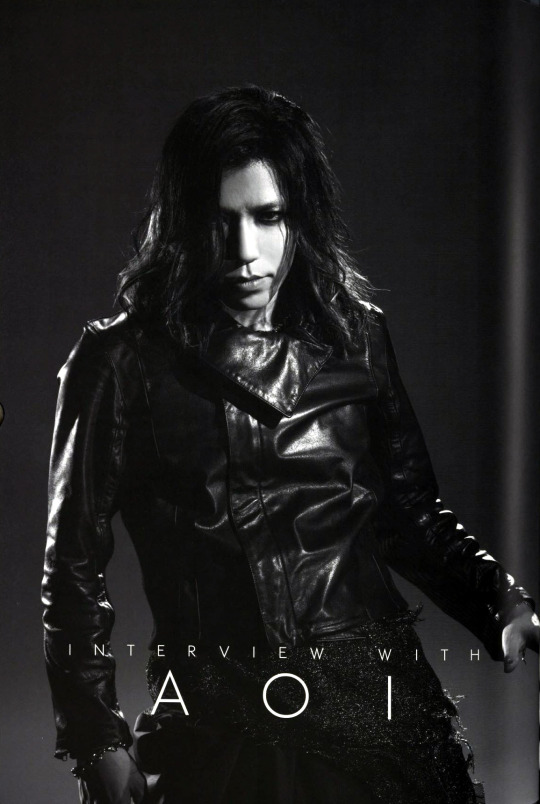
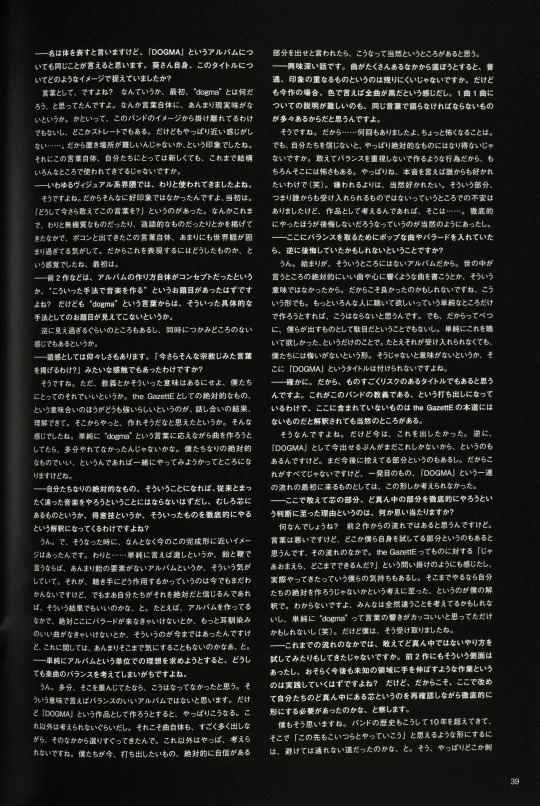
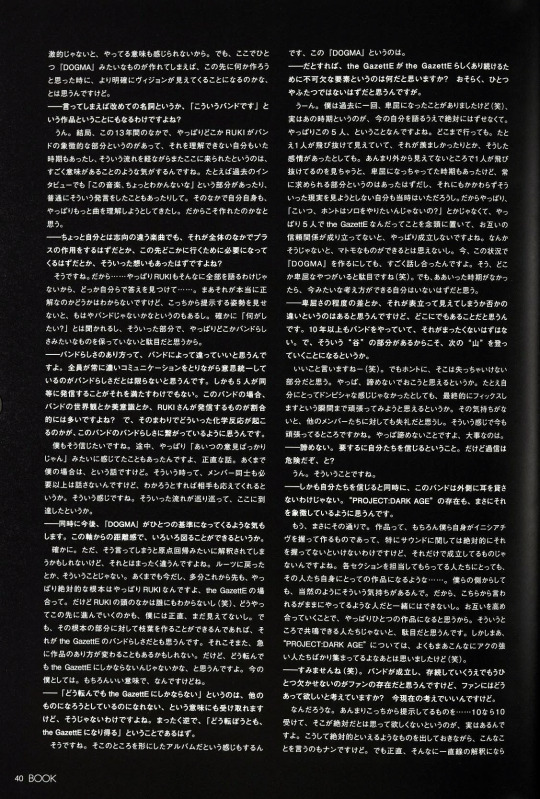
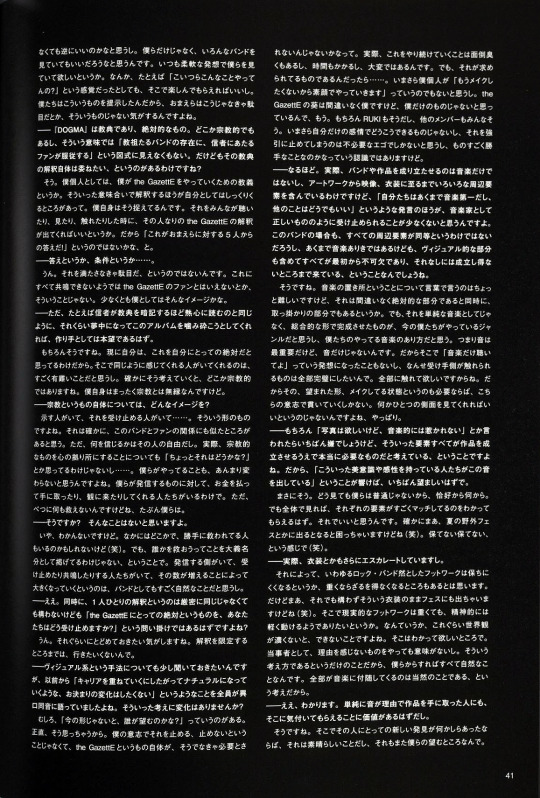
Interviewer: It’s often said that a name represents its essence, and I think the same can be said about the album "DOGMA." What kind of image did you have of this title, Aoi-san?
Aoi: You mean as a word, right? At first, I wondered, “What is 'dogma'?” The word itself didn’t feel very real to me. It wasn’t completely disconnected from the band’s image, but it also wasn’t straightforward. It didn’t quite fit comfortably anywhere. Also, while the word was new to us, it had been used in many contexts before.
Interviewer: It's been quite commonly used in the visual kei scene, hasn't it?
Aoi: Yes, exactly. So, initially, I didn’t have a great impression of it. I wondered, “Why use this word now?” There was that feeling. In our past works, we've often embraced somewhat impersonal or coined terms, and this word "dogma" appeared suddenly, with a worldview that seemed too fixed. At first, it was difficult to grasp how to approach it.
Interviewer: The previous two albums had a clear concept in terms of how the music was made, right? But with the word “dogma,” it’s hard to see a specific method or theme.
Aoi: It’s paradoxical. It’s both too clear and too elusive at the same time.
Interviewer: The word has a grandiose feel. Did it feel strange to use such a religious-sounding word now?
Aoi: Yes, but in our discussions, it became clear that it represented an absolute thing for us, something fundamental to the GazettE. Once we understood that, it started to feel doable. Simply creating songs that respond to the word “dogma” wouldn’t have worked. But if it’s about our absolute essence, then we could work with that.
Interviewer: Your own absolute essence. That wouldn’t mean creating completely different music, but rather, focusing on what you’re best at, right?
Aoi: Yes. When we thought of it that way, we started to see the final form of the album. It felt more intense, like there weren’t many sweet elements. We’re not sure how it will affect listeners, but if we believe in it absolutely, then that result is fine. In the past, we might have thought we needed a ballad or a more familiar song. But for this, we didn’t worry about that.
Interviewer: Usually, when striving for an ideal album, you tend to think about the balance of the songs.
Aoi: If we had focused on that balance, it wouldn’t have turned out this way. In that sense, it’s not a balanced album. But making it as “DOGMA” naturally led to this. We couldn’t imagine it any other way. We created many songs and carefully selected from them, which led to this result. This is what we wanted to showcase, with absolute confidence.
Interviewer: That’s an interesting point. Normally, when selecting from many songs, you avoid ones that overlap in impression. But in this case, all the songs feel dark, like they’re all black in color. It’s hard to describe each track individually because many are expressed in similar terms.
Aoi: Exactly. There were times when it felt a bit scary. But if you don’t believe in yourselves, it can’t become something absolute. Making an album without worrying about balance is inherently scary. We want to be liked rather than disliked, naturally. There was a fear that it wouldn’t be accepted, but as a work, it’s better not to have regrets. If we had added pop songs or ballads for balance, we might have regretted it.
Interviewer: So, if you had aimed to write universally good or heart-touching songs, it wouldn’t have turned out this way. But perhaps that’s why it’s good.
Aoi: Yes, the starting point wasn’t to write universally acclaimed songs. It was simply about what we wanted people to hear. Even if it’s not accepted, we have no regrets. Otherwise, we couldn’t have titled it “DOGMA.” It’s a risky title because it asserts our doctrine. If something isn’t included here, it’s not part of the GazettE’s core path.
Interviewer: It’s true. This title indicates that what’s included here is essential to the band. If it’s not included, it suggests it’s not part of the GazettE’s core.
Aoi: Exactly. But right now, this is what we wanted to release. We don’t have more to show for “DOGMA” at this moment. There’s more to come in the future, but for the first release in this series, this form is the only one we could think of.
Interviewer: What led you to the decision to focus on your core essence so thoroughly here?
Aoi: It’s hard to say. It’s a flow from the previous two works. There’s a part of us testing ourselves within that flow. It felt like a challenge to see how far we could go with the GazettE. If we were going to go that far, it made sense to establish our absolutes. That’s my interpretation. Others in the band might have different thoughts, maybe they just thought “dogma” sounded cool (laughs). But that’s how I took it.
Interviewer: In the past, you’ve deliberately tried different approaches, even in the last two albums. You’ll probably continue exploring new areas in the future. But it seems you needed to reaffirm and shape your core essence now.
Aoi: I think so too. The band has been around for over ten years, and to continue working together in the future, this was a necessary step.
Aoi: If it’s not intense, I can’t feel a reason to do it. But, I think that after we create something like “DOGMA,” then when we think about creating something in the future, our vision will become clearer.
Interviewer: So to put it bluntly, it’s like creating a noun again, it becomes a work that says "this is the kind of band we are," right?
Aoi: Yeah. Ultimately, over these 13 years, there were times when I didn’t quite understand RUKI's symbolic part of the band, but reaching this point now feels significant. For example, in past interviews, I’ve said things like, “I don’t really understand this music.” During that time, I tried to understand the songs more deeply. That’s probably why we were able to create this album.
Interviewer: Even if a song didn’t align with your own tastes, you believed it would add value to the whole, or it was necessary for where you were heading in the future, right?
Aoi: Yes, that's right. So... RUKI doesn't really explain everything, so we have to find answers ourselves... Whether those answers are correct or not is uncertain, but we need to show a proactive stance. If we don’t, we might not really be a band anymore. We do get asked, “What do you want to do?” and we have to maintain a sense of being a band.
Interviewer: What it means to be a band can differ. It’s not necessarily about everyone always having intense communication and unified intentions. In the case of this band, there are a lot of elements like the band’s worldview and aesthetics that RUKI transmits, right? And the chemistry that happens around that defines your band’s essence.
Aoi: I want to believe that too. Honestly, there were times when I felt like it was just about his opinions. That was just my perspective. At such times, the members don’t talk more than necessary to each other, but if you try to understand, the other person responds. It's that kind of feeling. Such a flow comes around, and that’s how we got here.
Interviewer: I also feel that "DOGMA" will become a standard to measure various things against in the future.
Aoi: Indeed. Saying that might be interpreted as a return to roots, but it’s completely different. It’s not about going back to our roots. It’s still about the present and, probably the future too. RUKI remains the core of the GazettE. But no one really understands what’s in RUKI's head (laughs), and I honestly don’t know how we’ll progress from here. However, if we can branch out from that core, that’s the essence of the GazettE. Our way of creating works might change. But no matter what happens, it will still be the GazettE. That’s what I believe now. In a good sense, of course.
Interviewer: When you say “it will still be the GazettE,” it could be taken as meaning that you can’t become anything else, but that’s not the case. It means that no matter how things turn, it will still be the GazettE, right?
Aoi: Yes. That’s how I feel about it.
Interviewer: So, what do you think are the essential elements for the GazettE to continue being the GazettE? I’m sure it’s not just one or two things.
Aoi: Hmm. There was a time when I was quite self-deprecating (laughs), but that period is essential to my current self. Ultimately, it’s about these five members, no matter what. Even if one person seems outstanding and I feel envious of that, or if there used to be such feelings. Even though there were times when I saw someone standing out who wasn’t very visible from the outside, there must have been a part that was always sought after, and yet at that time, I didn't try to see that reality. So, after all, it’s important to keep in mind that "this person doesn't really want to do it solo, do they?" and that it's really the GazettE with these five people, and it’s important for mutual trust to exist, or it just won’t work. Otherwise, I don’t think we can make anything decent. Even now, in this situation, when we were making "DOGMA," we talked a lot. Yes, it's no good if there’s someone who's a bit self-deprecating (laughs). But I think if there hadn’t been such a time, I wouldn’t have been able to think the way I do now.
Interviewer: Everyone experiences different degrees of self-deprecation, and whether it’s visible or not, it’s something that’s always there. After more than 10 years as a band, it’s natural to have such phases. Those “valleys” allow you to climb the next “mountains,” so to speak.
Aoi: You’re absolutely right (laughs). That’s something we shouldn’t lose. It’s about not giving up. Even if it doesn’t feel right for you personally, you push through until the final moment of fixing it. Without that mindset, it’s disrespectful to the other members. That’s what we’re working on now. It’s important not to give up.
Interviewer: Not giving up. Essentially believing in yourselves but being wary of overconfidence?
Aoi: Yes, exactly.
Interviewer: Moreover, while believing in yourselves, your band is not completely closed off to outside influences. The existence of “PROJECT: DARK AGE” symbolizes that.
Aoi: Exactly. While we take the initiative in creating our works, especially regarding sound, it’s not something we do alone. It becomes a project for everyone involved. We need people who can resonate with that. That’s what makes a work complete. Only with people who can elevate each other can we create something meaningful. However, with “PROJECT: DARK AGE,” I did feel like we gathered a bunch of strong personalities (laughs).
Interviewer: Another essential element for the band’s existence and continuity is the fans. What do you want from them? Just your current thoughts.
Aoi: What is it? I don’t want them to take everything we present as absolute. Even though we’re putting out something we consider absolute, I don’t want them to have a one-track interpretation.
Aoi: Even if they don’t take everything we put out as absolute, that might actually be a good thing. I think it’s fine if our fans also check out other bands, and view us with a flexible mindset. For example, even if they think, “What are these guys doing now?” I just want them to enjoy it. It’s not like we’re saying, “We’re presenting this, so you must accept it in a certain way.”
Interviewer: "DOGMA" is a sacred text, an absolute thing. It has a somewhat religious aspect. In that sense, it could be seen as the band being the leaders and the fans being followers. However, you want to leave the interpretation of that sacred text up to the fans, right?
Aoi: Exactly. Personally, I see it as a set of principles for me to continue being part of the GazettE. That’s how I interpret it, and it feels right to me. I think it’s great if everyone listens, watches, and engages with it in their own way and develops their own interpretation of the GazettE. So, it’s not like we’re saying, “This is the answer from the five of us to you.”
Interviewer: It’s more like a set of conditions, rather than an answer.
Aoi: Yes, and it’s not like if you don’t meet these conditions, you can’t be a fan of the GazettE. At least, that’s not my perspective.
Interviewer: But, like a devoted follower memorizing a sacred text, it would be ideal if fans get deeply engrossed in this album and try to fully understand it.
Aoi: Of course. Personally, I consider it my absolute truth. It’s very gratifying if there are people who feel the same way. In that sense, it is somewhat religious. Even though I am not religious at all.
Interviewer: What is your image of religion?
Aoi: There are those who show something, and there are those who accept it... It's that kind of thing, isn't it? Certainly, I think there are similarities to the relationship between this band and its fans. However, what one believes in is up to the individual. I don’t see anything wrong with people finding solace in something religious. What we’re doing isn’t much different. There are people who pay to take in what we put out. However, we probably can’t really save anyone.
Interviewer: You don’t think so? I believe you do.
Aoi: Well, I'm not sure. There might be people out there who feel like they've been saved in some way (laughs). But, we’re not doing this with the grand purpose of saving someone. There are creators who send out something, and there are people who receive it or resonate with it. The more people resonate with it, the bigger it becomes. That feels very natural for a band.
Interviewer: Yes. Each person’s interpretation doesn’t need to be exactly the same, but it is like asking, “How will you receive the absolute aspect of the GazettE?”
Aoi: Yes, I think that’s a good place to leave it. I don’t want to go as far as limiting interpretations.
Interviewer: I also wanted to ask a bit about the visual kei approach. Previously, you all mentioned not wanting to go down the predictable path of becoming more natural as you gain experience. Has that mindset changed?
Aoi: Not really. I think, “If we’re not like this, who would want it?” It’s not something I can just stop or continue on my own will. The GazettE needs to be this way to be necessary. Honestly, continuing this way is a hassle, time-consuming, and tough. But if it’s what’s desired… I can’t just say, “I don’t want to do makeup anymore, I’ll go natural.” Aoi from the GazettE is undeniably me, but it’s not just about me anymore. The same goes for RUKI and the other members. It’s not something I can change based on my own feelings, stopping it forcefully would just be selfish and unnecessary ego.
Interviewer: I see. Indeed, music alone doesn’t define a band or a work. There are many surrounding elements like artwork, videos, and costumes. Some may say, “We are purely about the music, everything else doesn’t matter,” and that might seem like the correct stance for musicians. However, for your band, while music is fundamental, all visual elements are essential too. Without them, it wouldn’t be complete.
Aoi: Exactly. It's hard to put into words, but while music is absolutely central, it’s also just the starting point. What we create isn’t just simple music; it’s a comprehensive form. Our genre and the way we make music are about completing this holistic form. Sound is crucial, but it’s not just about sound. We want everything the audience interacts with to be perfect. That includes the visuals and makeup, if it’s necessary for what’s desired. We’re not just about one aspect.
Interviewer: Of course, hearing someone say, “I like the photos but not the music” would be disappointing. But you believe all these elements are essential for the work to be complete, right? Ideally, the aesthetic and sensibility behind the music should resonate as well.
Aoi: Absolutely. We’re definitely not ordinary, from our looks to everything else. But if you see us as a whole, you’ll realize how all the elements match perfectly. That’s enough for me. Sure, it’s tricky for summer outdoor festivals and it’s hard to maintain (laughs).
Interviewer: Your costumes have become more elaborate too.
Aoi: It does make it harder to move like a typical rock band, heavier in a way. But we still go to festivals like this (laughs). Even if it’s physically demanding, I want to keep moving lightly in spirit. This kind of intense worldview is something you can’t achieve otherwise. As long as it feels justified, it’s meaningful for us. For us, it’s all natural. Everything naturally accompanies the music.
Interviewer: Yes, I understand. For people who initially pick up your work because of the music, noticing these elements is valuable.
Aoi: Indeed. If it leads to new discoveries for them, that’s wonderful and exactly what we hope for.
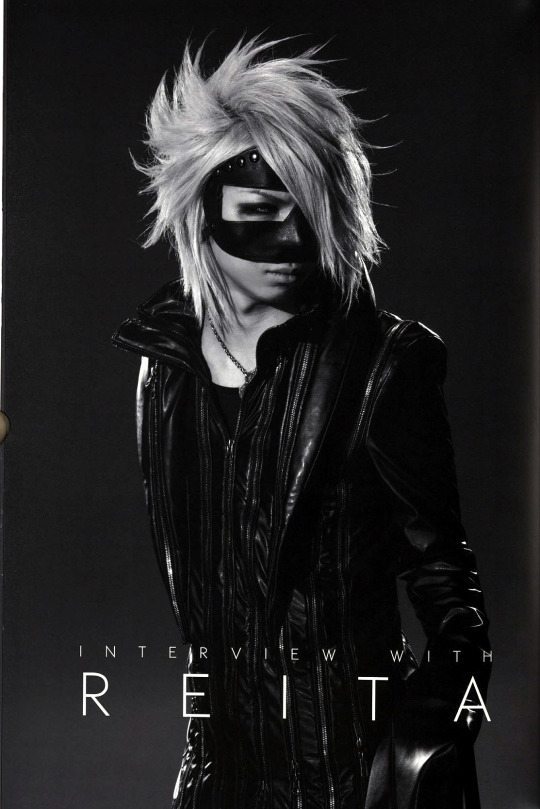
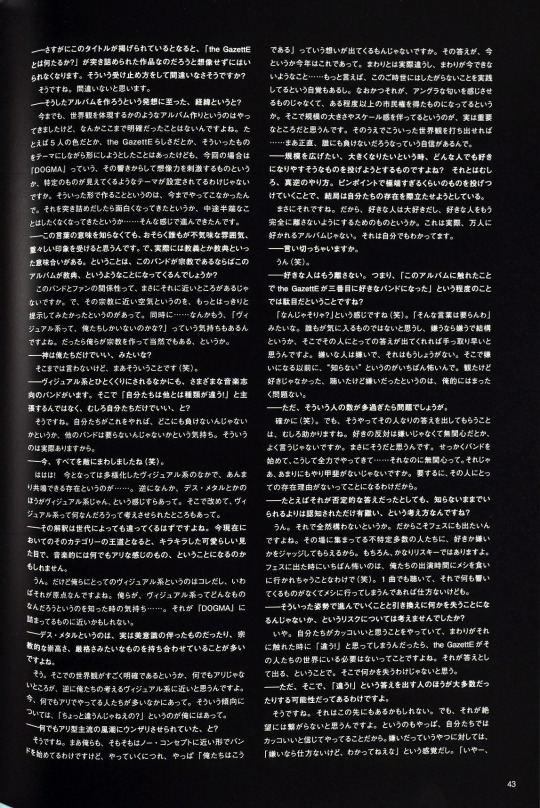
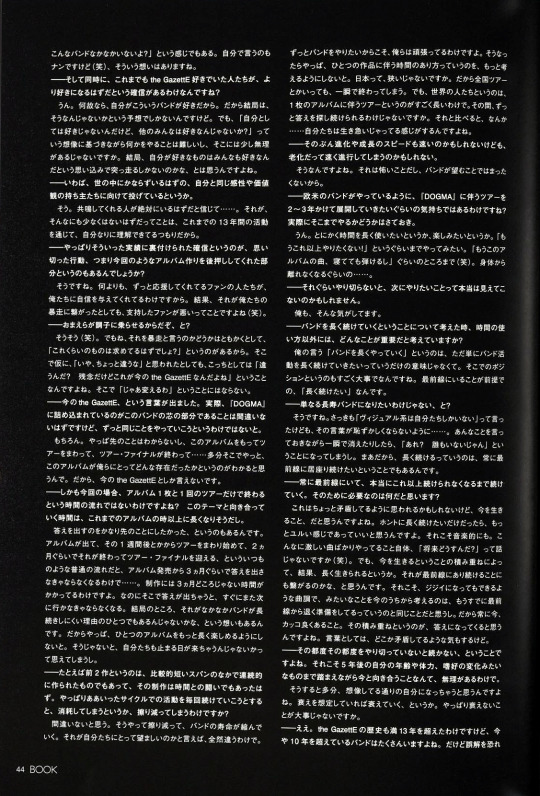
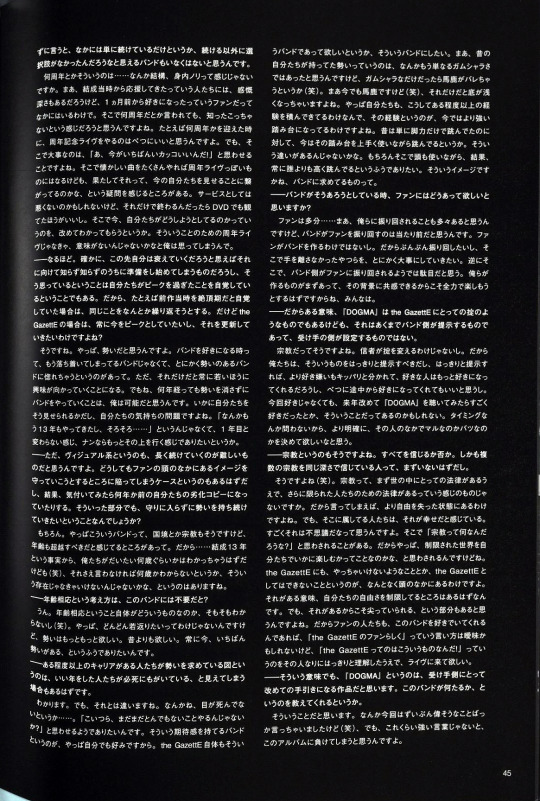
Interviewer: When you put out a title like "DOGMA", it’s inevitable that people will wonder, "What is the GazettE?" It makes you imagine that this work delves deeply into that question. Is that the correct way to perceive it?
Reita: Yes, I think that's right.
Interviewer: What led you to the idea of creating such an album?
Reita: Up until now, we've made albums that embody a certain worldview, but it's never been this clear. We've tried to shape things based on themes like the colors of the five of us or the essence of the GazettE. However, this time, with the theme of "DOGMA," the very sound of the word stimulates imagination and suggests a specific concept. We've never created an album with such a defined theme before. As we delved into it, it became more interesting and we didn’t want to do anything halfway. That’s how it progressed.
Interviewer: Even without knowing the meaning of the word, I think everyone will get a sense of a creepy, heavy atmosphere. And in reality, it means doctrine or scripture. So, if this band were a religion, would this album be its scripture?
Reita: The relationship between this band and its fans is quite similar to that, isn’t it? We wanted to clearly present that quasi-religious atmosphere. At the same time, we also feel like, "Are we the only ones left in visual kei?" If that’s the case, then it’s only natural for us to create our own religion.
Interviewer: Are you saying, "We are the only gods"?
Reita: I wouldn’t go that far, but yes, something like that (laughs).
Interviewer: There are various bands within the visual kei scene with different musical directions. Instead of asserting that "we're different from others," you’re saying it’s more like, "It's okay with just us"?
Reita: Yes, we feel that if we do this, we won't lose to anyone, and other bands aren’t necessary. That's how we feel.
Interviewer: Now, you've turned everyone into your enemies (laughs).
Reita: Hahaha! Given the diversity in visual kei today, there aren't many others we resonate with... To be honest, death metal seems more visual kei to me these days. It made me reconsider what visual kei really is.
Interviewer: That interpretation can differ by generation. Nowadays, the mainstream in that category might be characterized by a cute, sparkling look with an anything-goes musical approach.
Reita: Yeah. But for us, this is what visual kei is, and it's kind of our origin. It's how we felt when we first learned about visual kei... That might be close to what's packed into "DOGMA."
Interviewer: Death metal often accompanies an aesthetic sense, religious sublimity, and strictness.
Reita: Exactly. The clarity of that worldview, the fact that it's not just anything goes, is close to our idea of visual kei. Nowadays, there are many who do anything goes, but to me, that feels a bit off.
Interviewer: So, you were fed up with the mainstream trend of doing anything goes?
Reita: Yeah. Well, we started the band with a close-to-no-concept approach, but as we continued, the feeling of "this is who we are" emerged. That answer is what we have now. We are different from others, and we’re doing things that others can’t or wouldn’t want to do in this era. Moreover, it's not something that has a hint of the underground but rather something that has gained a certain level of acceptance. The scale and scope are important. By presenting such a worldview, I honestly believe we can’t be beaten.
Interviewer: When people aim to expand and grow, they mostly try to throw something that anyone can easily like, right? But you’re doing the exact opposite. By throwing something extremely pinpointed and extreme, you’re trying to highlight your own existence.
Reita: Exactly. So, people who like it will love it, and it’s meant to keep those who like us from ever leaving. This album isn’t something that everyone will like. I myself understand that.
Interviewer: You say that so definitively.
Reita: Yes. (laughs)
Interviewer: You want to ensure that those who like you will never leave. So, it’s not enough if someone listens to this album and thinks, "the GazettE is my third favorite band"?
Reita: "What's that?" That's the feeling (laughs). We don’t need such words. I know not everyone will like it, and if they hate it, that’s fine, as long as they come to their own conclusion. If someone dislikes it, that’s unavoidable. What’s most frightening is "not being known." Seeing but not liking, listening but hating, is not a problem for me.
Interviewer: Although, if too many people felt that way, it would be a problem.
Reita: True (laughs). But it helps to have people come to their own conclusions. They often say the opposite of love is not hate, but indifference. That’s exactly what I think. We started this band and have been doing our best... if people are indifferent, that’s unfulfilling. It means our existence doesn’t matter to them.
Interviewer: So even if the response is negative, being recognized is more important than being unknown?
Reita: Yes, I have no problem with it. That’s why I want to perform at festivals. Because there, a diverse crowd will judge if they like us or not. Of course, it’s risky. The scariest thing is people going to eat during our set. (laughs) If they listen to one song and then leave because they felt nothing, there's nothing you can do.
Interviewer: Didn't you consider the risk that pursuing this path might result in losing something?
Reita: No. If what we think is cool makes people think "that's.. different" then the GazettE doesn’t need to be in their world. That’s the answer. I don’t think we lose anything there.
Interviewer: But what if the majority ends up thinking "that's different"?
Reita: Yes, that might happen. But it won’t lead to despair. Because we believe what we’re doing is cool. To those who say they hate it, I’d just think, "If you hate it, that’s fine, but you don’t get it."
Reita: There aren't many bands like us, right? That's what I think. It might sound conceited (laughs), but that's how I feel.
Interviewer: And at the same time, you're confident that those who have liked the GazettE up until now will like you even more with this release, right?
Reita: Yes. Because I myself like bands like this. So, in the end, it's just my assumption. But it's hard to do something based on the idea, "I don't like it, but maybe everyone else will?" That just feels a bit forced. In the end, you have to run with the belief that what you like, everyone else will like too.
Interviewer: In other words, you're aiming at people out there who share the same sensibilities and values as you do.
Reita: Yes. I believe there are definitely people who will resonate with us. Through our 13 years of activity, I've come to understand that there are quite a few of those people out there.
Interviewer: Do you think that this confidence, backed by your past achievements, has pushed you to take bold actions, like making this album?
Reita: Yes. Above all, the fans who have supported us all along have given us the confidence. So even if that leads to us going a bit overboard, it’s the fans' fault for encouraging us. (laughs)
Interviewer: "It's your fault for getting us all fired up," right?
Reita: Exactly. (laughs) But, whether you call it overboard or not, we have a sense of "this is what you’re expecting from us, right?" So even if people think, "No, this isn’t it," we can say, "Too bad, but this is what the GazettE is now." We're not going to change just because of that.
Interviewer: You mentioned "the current GazettE." While it's clear that "DOGMA" represents the core of the band, you’re not saying you'll always do the same thing.
Reita: Of course. You never know what’s ahead. After we release this album, tour with it, and finish the final show, then maybe we'll understand what this album means to us. So, I can only say it's the current GazettE.
Interviewer: This time, it seems like the period you'll spend on this theme will be longer than usual.
Reita: We wanted to delay finding the answer a bit longer. Usually, after releasing an album, we start touring about a week later, finish it in two months, and reach the tour final. In such a typical flow, you end up having to find the answer within about three months from the album release. But making an album takes way longer than three months. If we have to find the answer in that short time, we have to move quickly. I feel that this is one reason why bands don't last long. We need to enjoy one album for a longer time. Otherwise, I feel like we might come to a stop.
Interviewer: For instance, the previous two albums were made in a relatively short span and were battles against time. Trying to keep up such a cycle might wear you down, right?
Reita: Definitely. You get worn out, and the band’s lifespan gets shorter. That's not desirable for us at all. We want to keep doing the band, that's why we work hard. So, we need to think more about the way we spend time on each album. Japan is small, so even a national tour ends quickly. But in other countries, the tours for one album last much longer. They keep searching for answers during that time. Compared to that, I feel like we’re rushing too much.
Interviewer: Your evolution and growth might be fast, but aging might progress quickly too.
Reita: Exactly. That’s scary, and not what we want at all.
Interviewer: Do you feel like you want to do a tour for "DOGMA" for 2-3 years, like bands in the West do?
Reita: Yes. I want to spend more time and enjoy it more. I want to do it until I feel like I can't do it anymore. I want to get to the point where I can play the songs in my sleep. (laughs) Until it sticks with me that much.
Interviewer: Maybe you won't see what you want to do next until you go all out like that.
Reita: I think so too.
Interviewer: When thinking about keeping the band going for a long time, what do you think is important aside from how you use your time?
Reita: When I say I want to keep the band going for a long time, I don’t just mean continuing the band's activities. The position we’re in is very important. I want to continue for a long time while being at the top.
Interviewer: You don’t just want to be a long-lived band?
Reita: Right. Like I said before, "there’s no one else in visual kei but us," and I don’t want those words to become embarrassing. If we say something like that and then disappear quickly, it would be like, "Oh? There's no one left." So, to continue for a long time means we want to stay at the forefront.
Interviewer: To always be at the forefront and continue until you really can't anymore. What do you think is necessary for that?
Reita: This might sound contradictory, but I think it’s living in the present. If you only want to continue for a long time, you could take it easy. Musically too. If we keep doing only intense songs, it's like, "What is there left to do in the future?" (laughs). But I think by living in the present, we can continue for a long time. That’s what keeps us at the forefront. If we start thinking about making songs that we can play even as old men, it’s like we’re already preparing to step back. So, always being cool in the present is important. That accumulation is the answer, I think. It might sound contradictory though.
Interviewer: If you don't give it your all each time, you can't keep going, right? Considering your age, physical strength, and preferences five years from now while facing the present is impossible. If you think like that, you might just become the person you imagine. Assuming you’ll decline and then changing things because of that. It’s important not to decline.
Reita: Exactly. The GazettE has been around for over 13 years now, and there are many bands that have been around for more than 10 years. But...
Reita: Honestly, I think there are some bands out there that are just continuing because they had no other choice..
Celebrating anniversaries and such can sometimes feel like an insider thing. Sure, there are those who have been supporting us since the beginning and might find it deeply moving, but there are also fans who just started liking us a month ago. For them, it might not matter if we say it’s our anniversary. For instance, having an anniversary concert is fine. But what’s important is to make people think, “Wow, they are at their best right now!” If we just play a lot of nostalgic songs, it might feel like an anniversary concert, but I wonder if it really shows who we are now. As a service, it might not be bad, but if that’s all there is, it might be better to just watch a DVD. An anniversary concert should be about showing who we are now, not just celebrating the past.
Interviewer: I see. Indeed, if you think you’re going to decline in the future, you might subconsciously start preparing for it, and thinking that way means you’re aware you’ve passed your peak. If you thought the last album was the peak, you might try to repeat the same thing. But for the GazettE, you always want now to be the peak, and you want to keep updating it, right?
Reita: Exactly. I think it’s about momentum. When you start liking a band, it’s not a settled band, but a band with a lot of momentum. If you only go for that, you’ll always be interested in the younger ones. But I think it’s possible to keep that momentum even after many years. It’s about how you present yourselves and your mindset. Instead of thinking, “We’ve been doing this for 13 years, maybe it’s time to…” we should have the same or even more energy than in the first year.
Interviewer: Continuing as a visual kei band is particularly difficult. There’s the risk of getting stuck trying to maintain the fans’ image of you, which could result in becoming a deteriorated copy of your past selves. You want to keep your momentum and not fall into that trap, right?
Reita: Of course. I think bands like us should transcend borders, religions, and even age. From the fact that we’ve been together for 13 years, people can guess our ages, but if we don’t mention it, they wouldn’t know. We shouldn’t be bound by the idea of acting our age.
Interviewer: So the concept of acting your age doesn’t apply to this band?
Reita: Exactly. I don’t even know what acting our age means. We don’t want to just get younger, but we want more momentum. More than before. We always want to be seen as having the most momentum right now.
Interviewer: To some people, seasoned bands trying to seek momentum might look like older folks desperately flailing.
Reita: I understand, but it’s different. It’s like our eyes aren’t dead. We want people to think, “These guys are still going to do amazing things.” I personally like bands that give you that feeling. I want the GazettE to be that kind of band. In the past, our momentum might have just been reckless, but being reckless alone reveals a lack of depth. Even now, we might still be a bit reckless, but we’ve gained a lot of experience that serves as a stronger base now. Before, we just jumped with leg strength, but now we use that base to jump even higher. We want to be the ones who always jump higher than anyone else, using both our heads and our experience.
Interviewer: When the band strives to be like that, how do you want the fans to be?
Reita: I think fans will often feel like they’re being dragged along by us, but I believe that’s natural. Fans don’t create the band. We want to keep swinging them around, and we want to cherish those who hold on. On the other hand, if the band gets swung around by the fans, it’s no good. We create something first, and people empathize with that and enjoy it fully.
Interviewer: In that sense, “DOGMA” is like a set of rules for the GazettE, but it’s the band that presents them, not the audience.
Reita: It’s like religion. Believers don’t change the rules. We should present them clearly, and if we do, it will be clear who likes and dislikes it, and those who like it will like it even more. It’s okay if people start liking us halfway through. Even if they don’t like it now, they might listen to “DOGMA” again next year and really like it. I want them to clearly decide if it’s a hit or miss for them.
Interviewer: That’s like religion too. You either believe everything or nothing. No one deeply believes in multiple religions equally.
Reita: Right. Religion has general laws and then additional laws for a limited group. It means you lose more freedom, but the people in it feel happy. It’s fascinating. I often wonder what religion really is. It’s about enjoying a restricted world in your own way. The GazettE also has things we shouldn’t do or can’t do as the GazettE. That might limit our freedom, but it also keeps us sharp. So if fans like this band, they should understand what the GazettE is and come to our concerts with that understanding.
Interviewer: “DOGMA” is a guide for the fans to understand what this band is all about.
Reita: I think so. I’ve been saying some pretty bold things, but we need strong words like this to match the album.
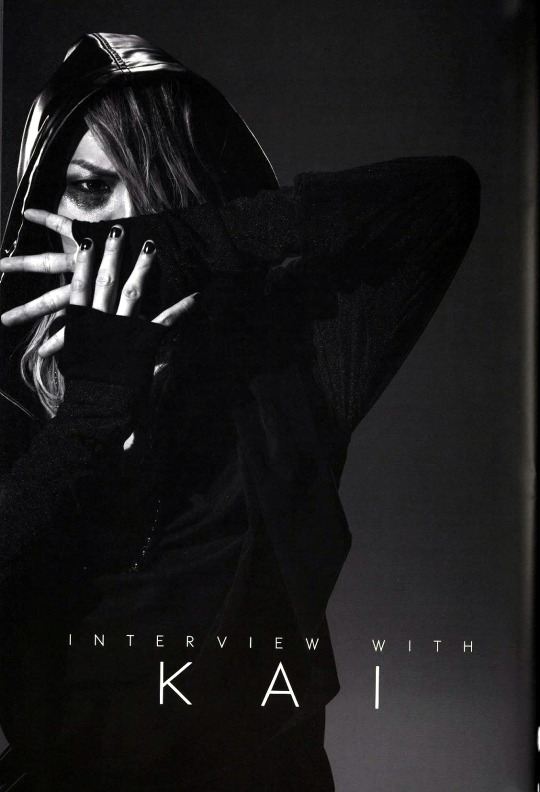
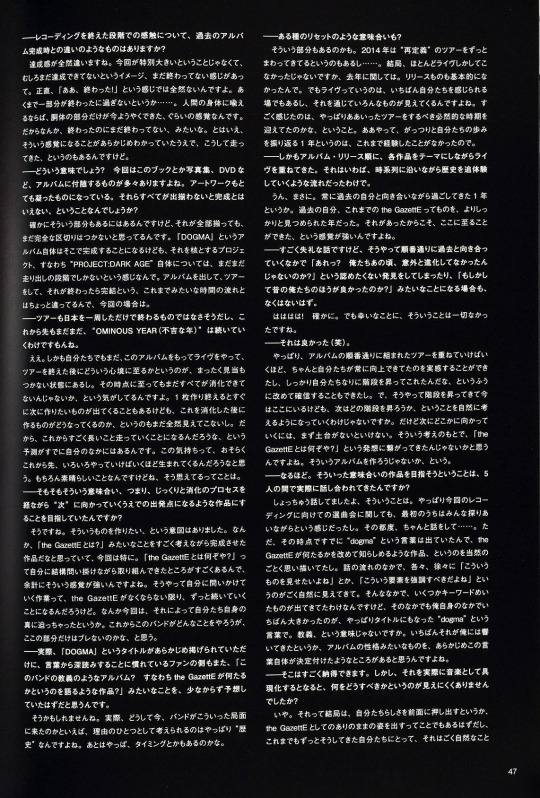
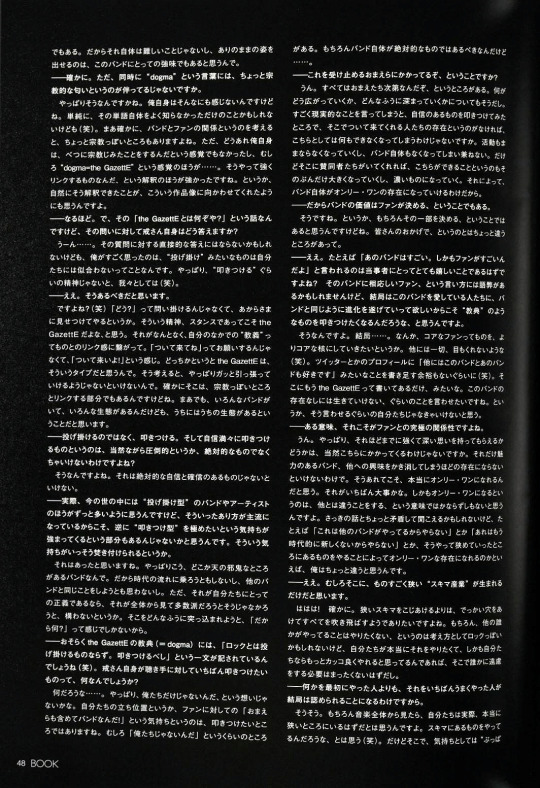
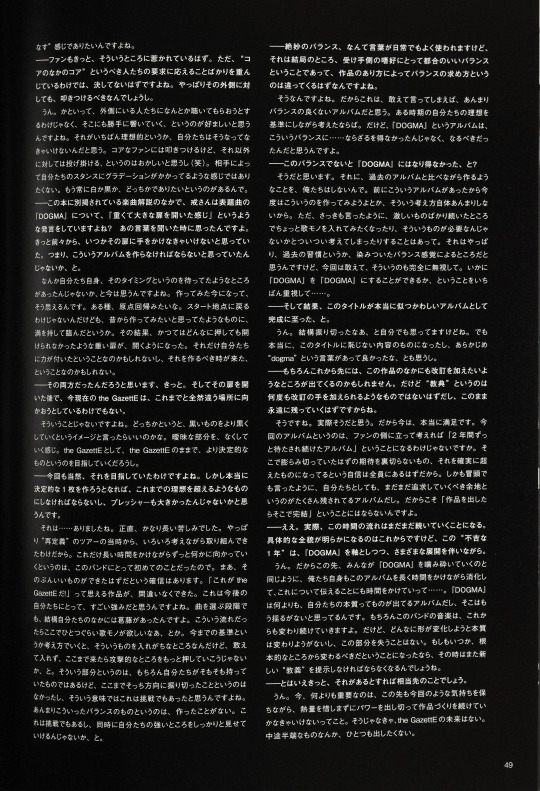
Interviewer: Looking back at the recording process, how does it compare to the completion of previous albums?
Kai: The sense of accomplishment is entirely different. It's not that this time is particularly significant, but rather that it feels like it's not quite finished yet. Honestly, it doesn't feel like a definitive "Ah, it's done!" moment at all. It feels like only a part of the process has been completed. To use a human body as a metaphor, it's like we've only just completed the torso. So, it's like we're finished, yet not finished. I was aware that I would feel this way from the start, and that’s how we’ve been progressing.
Interviewer: What do you mean by that? This time, there are many additional elements like the book, photo album, and DVD. The artwork is also very elaborate. Does this mean it won't feel complete until everything is released?
Kai: That's part of it, but even when everything is ready, I don’t think it will feel like a complete closure. The album "DOGMA" itself will be complete, but the "PROJECT: DARK AGE," is still just starting. The flow of time is different this time. It's not like before, where we released an album, toured, and then it was done.
Interviewer: The tour seems far from over, as it’s not just confined to Japan. It looks like the "OMINOUS YEAR" will continue.
Kai: Yes, and we still don’t know what our mindset will be after the album and tour. I feel like we won't have fully processed everything by then. Sometimes, right after finishing an album, you want to start creating the next one. But I can't see what we’ll create after digesting this one. I predict that we'll be running for a long time from now. This feeling will probably grow stronger as we move forward, which is a wonderful thing.
Interviewer: Did you aim to create this album as a starting point for a slow and thorough process leading to the next phase?
Kai: Yes, we intended to create something like that. This work was being done while we pondered deeply about what "the GazettE" means. This reflection has been especially strong this time. The process of questioning myself about the band's essence will continue as long as the GazettE exists. This time, we’ve delved into our true essence. Regardless of what we do in the future, I think this core part will remain unshaken.
Interviewer: Fans, used to interpreting your words deeply, might have expected this album to define the GazettE's doctrine, given its title "DOGMA."
Kai: That might be true. One of the reasons we reached this point is due to our history. Timing also plays a part.
Interviewer: Was there a sense of resetting involved?
Kai: Maybe. We toured under the theme of "redefinition" in 2014, performing mostly live shows and not releasing much. Live shows are where we feel the most like ourselves and gain various insights. I felt that it was a necessary time to thoroughly reflect on our journey, something we hadn’t done before.
Interviewer: The tour followed the release order of your albums, allowing you to relive your history in chronological order.
Kai: Exactly. It was a year of constantly facing our past. We were able to look at the GazettE and ourselves more closely than ever before. This is why we’ve reached the point we are in now.
Interviewer: This might sound rude, but didn’t you discover anything you’d rather not admit, like thinking you hadn’t progressed as much as you’d hoped or that your earlier work was better?
Kai: (Laughs) Fortunately, not at all.
Interviewer: That’s good to hear (laughs).
Kai: As we performed more tours following the order of our albums, we realized we had consistently improved and climbed our own ladder. Now, we're here, and naturally, we start thinking about what ladder to climb next. But to move forward, we need a solid foundation. This led us to question, "What is the GazettE?" and create an album around that concept.
Interviewer: I see. Did you discuss this among the five of you?
Kai: Yes, we frequently discussed it. Initially, everyone was cautious, but we talked things over each time. The word "dogma" had already come up, so we naturally envisioned an album that reaffirms the essence of the GazettE. Through discussions, we gradually identified the elements we wanted to highlight. One of the most significant keywords for me was "dogma." It resonated with me and seemed to define the album's character.
Interviewer: That makes sense. However, when it comes to embodying that in music, wasn't it challenging to figure out what to do?
Kai: Not really. Ultimately, it's about fully expressing ourselves and presenting the GazettE as we are. We’ve always done that, so it felt natural to us.
Interviewer: True, but the word “dogma” also has a somewhat religious connotation, doesn’t it?
Kai: Maybe, but I don’t feel that much. Perhaps because I didn’t know the word well. (laughs) Sure, the relationship between a band and its fans can seem a bit like a religion. But for me, it wasn’t about doing something religious; it was more about “dogma of the GazettE.” That strong link in interpretation led me naturally to this project.
Interviewer: I see. What does “the GazettE” mean to you?
Kai: Well... It might not be a direct answer, but I feel that we are not suited to “throwing things out there.” We need to “smash it down” instead. That’s who we are.
Interviewer: Indeed, that’s how it should be.
Kai: Right? (laughs). Instead of asking, “How do you feel?” it’s about showing it blatantly. That’s the spirit, the stance that defines the GazettE. It links strongly with the concept of “dogma.” It’s not about asking fans to follow us; it’s about demanding they come along. That’s the type the GazettE is. So, we must lead with that strength. Sure, it might link with the religious aspect, but every band has its way. That’s ours.
Interviewer: Rather than “throwing it out,” you “smash down.” And what you smash down must be overwhelming or absolute, right?
Kai: Yes, it must be something we have absolute confidence and conviction in.
Interviewer: In today’s world, there seem to be more bands and artists that “throw things out there.” Don’t you think that makes you want to perfect the “smashing down” approach even more?
Kai: Yes, there’s that contrarian streak in our band. We don’t try to follow the trends or do the same as others. If it’s our truth, it doesn’t matter if it’s mainstream or not. Even if criticized, it’s like, “So what?”
Interviewer: I suppose the GazettE’s “doctrine” includes the phrase, “Rock is not about throwing out; it’s about smashing down.” What’s the one thing you most want to smash down to your listeners?
Kai: That It’s not just us. It’s about the feeling that “You, the fans, are also part of the band!” It’s about smashing down the sense that “It’s not just us.” The band must be absolute, but...
Interviewer: You mean it’s up to the fans to take it in, right?
Kai: Yes, everything depends on you. What spreads and deepens also relies on you. Speaking practically, if we throw down something confident, but no one follows, we can’t do anything. Our activities will falter, and the band might cease to exist. But if we have supporters, what we can do grows and deepens, making the band unique.
Interviewer: So the band’s value is decided by the fans too.
Kai: Yes, in part. It’s not just “thanks to you all.”
Interviewer: Like, “That band is amazing, and so are their fans,” right? Ultimately, you want fans to evolve with the band, which makes you want to smash down this “doctrine.”
Kai: Exactly. I want core fans to become even more core. So dedicated that they don't even have room in their profile to mention other bands (laughs). Just the GazettE. Saying they can’t live without us. We need to be that kind of band. That’s the ultimate relationship with fans.
Interviewer: Right. Having fans that deeply dedicated depends on the band’s charm, right?
Kai: Yes, we need to be a band so compelling that fans have no interest in others. Only then can we be truly unique. It’s not about doing something different from others but being compelling in our way.
Interviewer: Otherwise, it’s just a narrow niche.
Kai: Haha! Exactly. Instead of a narrow niche, we should aim to blow everything away. It’s very rock n roll to not follow others, but if we can do it, why hesitate?
Interviewer: The ones who do it best get recognized, not necessarily the first one to do it.
Kai: Right. In the big picture, we are niche, but we’re making our mark there.
Interviewer: Fans are surely attracted to that aspect. But it’s not just about prioritizing the demands of what you could call the "core of the core" fans. You must also aim to make an impact on those outside that core.
Kai: Yeah. But it’s not about trying to make those on the outside listen to us; it’s preferable if it resonates with them naturally. That’s the ideal, and I believe we need to achieve that. We strike hard at our core fans, but just throwing it out to everyone else would be strange (laughs). We don't want our stance to have a gradient based on the audience. We always want to be either black or white.
Interviewer: In the song commentary included in this book, you mentioned that the title track "DOGMA" felt like "opening a heavy and large door." When I heard that, I thought you must have felt that at some point, you had to reach out to that door. In other words, you thought you had to make an album like this eventually, right?
Kai: I think we were waiting for the right timing ourselves. Now that we’ve made it, I feel that way. It’s a kind of return to our roots. We’re not going back to the starting point, but we approached something we always wanted to create with full readiness. As a result, a heavy door that we couldn’t open no matter how hard we pushed before has now opened. Maybe it’s because we’ve gained strength, or maybe it was just the right time to make this.
Interviewer: It was probably a bit of both. And after opening that door, the current the GazettE isn’t necessarily trying to head to a completely different place than before.
Kai: Not at all. It’s more about making the dark parts even darker, so to speak. It’s about eliminating ambiguous parts and striving for something more definitive as the GazettE, while still being the GazettE.
Interviewer: Of course, that’s what you aimed for this time as well. But I think there must have been a lot of pressure to create a truly definitive piece that surpasses your previous ideals.
Kai: Yes... there was. Honestly, it was quite a long period of struggle. We worked on it while thinking about various things since the time of the "redefinition" tour. This was the first time for our band to continuously work toward something over such a long period. Well, I’m confident that the result is something good. We’ve definitely made a piece that we can proudly say, "This is the GazettE!" I believe this will be a great strength for us moving forward. Even in the stage of selecting songs, we had quite a bit of inner conflict. For instance, thinking, "In this flow, it would be nice to have at least one melodic song here." According to our previous standards or way of thinking, we would tend to include something like that, but we deliberately didn’t, deciding instead to push more on the aggressive side. This approach was something we originally had within us, but we had never gone this far in that direction before, so in that sense, it was also a challenge. We’ve never made something with this kind of balance. This is both a challenge and a way to firmly showcase our strengths.
Interviewer: The term "perfect balance" is often used in everyday life, but in the end, it’s just a balance that suits the preferences of the receiver. The way balance is sought depends on the nature of the work itself.
Kai: That’s right. So, to put it bluntly, this might not be a well-balanced album. If you consider it from the ideal of a certain period of ourselves. But the album "DOGMA" couldn’t have been balanced in any other way... it had to be like this.
Interviewer: In other words, it wouldn’t have been "DOGMA" if it wasn’t for this kind of balance?
Kai: Exactly. Also, we don’t create albums by comparing them to our past works. We don’t think, "We made this kind of album before, so let’s try making this kind now." As I mentioned earlier, there were times when we felt the need to add a melodic song after a series of intense tracks, thinking it might be necessary. That’s due to past habits or ingrained sense of balance. But this time, we completely ignored that. We focused most on making "DOGMA" as "DOGMA" as possible.
Interviewer: And as a result, you’ve completed an album that truly fits its title.
Kai: Yes. Even I feel that we really pushed the limits. But we’ve truly created something that lives up to the title, and I’m glad we had the word “dogma” from the beginning.
Interviewer: Of course, there may be parts within this work that you might want to revise in the future. But a “canon” isn’t something that can be repeatedly revised, and it’s meant to last forever in its current form.
Kai: Yes, I think so too. That’s why I’m really satisfied right now. For fans, this album is "an album they’ve been waiting for for two years." We’re confident that it’s something that won’t betray their high expectations, something that even surpasses them. Moreover, as I mentioned at the beginning, it’s an album with plenty of room for further exploration on our part. That’s why releasing a work doesn’t mean it’s complete.
Interviewer: Ofcourse. This flow of time will continue for quite a while.
Kai: The full scope will become clear moving forward, but this "ominous year" will involve various developments with "DOGMA" at its core. So, just like everyone will be breaking down "DOGMA," we’ll also spend a long time digesting this album and communicating about it. "DOGMA" is an album that reflects our essence more than anything, and I believe that part will remain unshaken. Of course, our music will continue to evolve, but no matter how much its form changes, the essence won’t change, and we won’t lose this part. If at some point, we decide that we need to change fundamentally, then we’ll have to present a new "doctrine" again.
Interviewer: But surely, if that ever happens, it will be far in the future.
Kai: Yes. Right now, the most important thing is to keep this mindset we have, continue creating works with the same passion and energy, and give our all. Otherwise, there is no future for the GazettE. We don’t want to release anything half-baked.
...
.......
...
Part 1 of the Dogma Book translations (members comments about each song)
Once again, all the scans are from the archive (rad-is-more) All translations are ChatGPT, edited by me. I added the book text pages themselves because I often read interviews and want to look more deeply into a certain passage but people never provide the source of the translation so it's impossible to do. This might not be the most aesthetic way to do an interview post but it's the most convenient for me personally. Also, I've noticed all the pieces like photos, art and interviews are very scattered on this site. Fragmentation only leads to misunderstanding and I am trying to piece everything together as much as possible, even though it leads to very long posts.
#the gazette#Featuring: ruki talking about taylor swift!#Reita and Uruha talking about how they want to pull you in to their core and have you locked there forever?#Ruki living rent free in aois head!#And kai hating it if you put other band names in your bio!#dogma book#interview translations#dogmatic#mi
87 notes
·
View notes
Text
had to mute the notifs on that reverse search post because it's drowning my activity but i wish i had a way to go back in and emphasize that the post was NOT about identifying generative images visually.
not only did i already try to explain how to do that once, but i subsequently learned how challenged people can be by interpreting that information. there is simply no way to describe with words alone the type of smoothly-contoured black shadows or strangely-layered character outfits that accompany a lot of ai imagery without also textually describing your average piece of warhammer fanart. it's simply not worth trying to compel people to overanalyze art technique as casual jpeg enjoyers, and some of the guides i've seen are very much a "one or two feldspars" kind of situation in assuming what the average person knows about lighting, anatomy, composition, color, or anything else that goes into an image. or, getting to my point now, even what the average artist actually knows about these things... or notices. in one of my recent drawings, a stray line i forgot to erase got colored like normal, and the result was a character appearing to have six fingers. ai confirmed???
a lot of people on that post keep trying to helpfully make additions that involve visually identifying the example as ai generated, but most people aren't going to notice things like brush stroke variance, or an elbow being A Little Weird (as if normal artists don't fuck up anatomy), or a piece's subject matter being anachronistic or otherwise "too modern". some are also just wrong, like the person saying "they're not wearing belts" as a reason it couldn't be a historical impressionist piece (men did not wear belts with their trousers outside of military and utility until the 1920s). the point is, as fun as it is on a personal level to play 'i spy' and find all the issues, for the average person, drag-and-dropping it into a search engine is gonna be a lot faster and more accurate.
57 notes
·
View notes
Note
What was the process like for writing the novelization for Splice? Would you consider writing a novelization of an existing work again?
Eek I'm being interviewed! I'M SO FAMOUS. There are a lot of parts to this answer. The shortest answer is that I really just watched SPLICE in tiny sections every single day for a very, very long time. I had a certain version of the script to work from, but it wouldn't contain the exact things that were said and done in front of the camera (no script would), so I just studied the movie. I scanned the sets for objects I could not identify, of which there are a LOT -- things I've never seen before, and things I've seen but couldn't name -- and searched online until I learned to describe things like hay trolleys and circulating baths. To me, the point of a novelization is that it produces an interior and sensorial experience not offered by a screen, so I tried very hard to expand on the material qualities suggested by the movie.

It never once occurred to me to change anything. Apparently this is an expectation of novelizations. I had a writeup in Fangoria that was very kind about my ability to make psychological sense out of the things people do in SPLICE, but that expressed disappointment that I hadn't added scenes or anything. I'm such an inveterate, pathetic sort of rule-follower, I didn't even ask myself about this. I did change one exact thing, regarding the kind of candy that Elsa eats, because it was meaningful and amusing to me to do so, but I don't think anybody will ever get it. I also included just a little bit of material from the script that didn't make it into the movie, because it was completely in line with my psychological interpretation, which was what I was most concerned with.

I never thought of SPLICE as a perfect film, but I had a lot of thoughts about it, and I think my main contribution was to explain what these characters are thinking and feeling as they wade into this life-changing and profoundly icky experience together. That became very personal very quickly and I was a little bit afraid that maybe this would be how everyone would find out how totally insane I actually am, but I'm told that that part worked out pretty good -- by Vincenzo Natali, among other people, who is SO NICE AND SMART AND SUPPORTIVE. Best guy! When I turned in my draft to the publisher I thought there might be a little back and forth, I did not expect them to send the raw document directly to Vincenzo and I was very alarmed when I heard from him before anybody else, but I really had nothing to fear. He's one of my favorite people now.
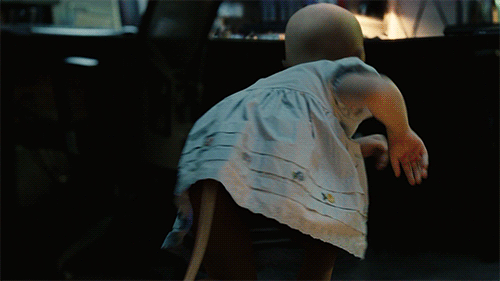
I would definitely do another novelization. Actually I think I'm uniquely suited to this because I have a good dose of aphantasia. I didn't even know until recently that it's statistically weird to think mostly or exclusively in words and to have a very hard time visualizing, like, almost anything. When I started telling people this about myself I was asked, among other things, "How do you do anything if you can't picture what you're going to do?" And I was like, uh...I don't know. Maybe this is connected to my extreme executive problems and my problems with goal formation and followthrough. I mean I think this is true, now. And I developed this sort of half-joking self-mythology that I have to be watching movies every second of the day because I suffer from an image deficit and I need external infusions. Like even when I used to draw (trauma took that away, long story, but I drew all the time for like half my life), almost everything I ever made was swipes -- and I think they're pretty good, like it's worthy as art. But I guess for me, art has to be made out of something external that I manipulate. All the art I've ever made without a reference point has been maybe technically OK but really lifeless, you can tell something is missing. So I think the novelization process was a lot like how I used to draw, where I had a completely concrete external referent and I would just sort of tour it very extensively until I had created a twin of it out of my interpretations. And the twin is like, the same but different, it's a clone made out of feelings and reactions. I think that's a worthy sort of art object to make.

There's a thing I'm working on now that I'm sure I won't be able to talk about for a long while, but it involves writing things from preexisting sketches and prompts, and that's a little bit the same. I don't have as much to go on, but I can tell what the shape of it could be, I just turn it over like, what if it's like this, what if it's like this, what if it's like this. And I know that what I'm turning out is really made out of tropes and archetypes, it's kind of a collage, but if the collaging is really earnest and you're feeling your way along with reasonable naturalness, it can turn into something. It's not that different from describing experiences you've had, if you really think about it. The following comment is NOT MEANT TO COMPARE MYSELF TO A GENIUS but I had this nice moment of synergy recently when I rewatched Kiyoshi Kurosawa's CURE, which to me seems so forcefully unique, but in interviews he says things like, "Well I just really wanted to make an American horror movie," and talks about how his starting point was not personal at all, he just wanted to play with the established tools and ingredients people use to build a certain kind of product. And I thought, I guess that's what I do -- not as intelligently or deliberately, but I get how you can work in a way that sounds so formal and empty, and have it produce something distinctly personal.
Thanks for your fun question!
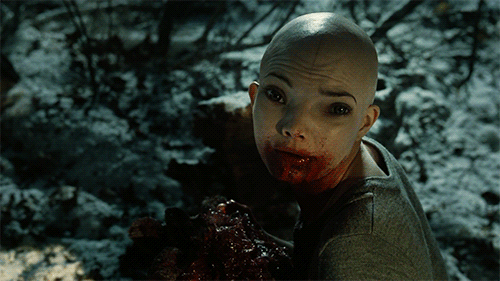
*Virginia Madsen voice* Oh yes. I forgot to tell you. BUY MY BOOK!
EDIT: Oh I kind of lied, I changed *just some of* the music that Clive listens to, to something that would be easier to communicate to a reader. Like I wouldn't use the exact band on the soundtrack because it was too obscure and specific, but I would talk instead about his genre choices because they went with what I was trying to say about him as a person. I think all of it was still pretty in line with the sounds, and the Clive, that appear in the film.
41 notes
·
View notes
Text
I really feel that Solas reflects this ability of spirits to fragment in such an interesting way. As spirits, they embody purposes without even trying to. We know he was Wisdom originally and was twisted into Pride by Mythal. His actions, and the relationships he formed while embodying one purpose or another, reflect and become coloured by the purpose he's embodying.
With Mythal, he has one of the last people who knew him as Wisdom, in his purest spirit form, where he was at his happiest. For thousands of years after manifesting, he was just Pride. When Mythal was killed, he lost one of those last mirrors of who he truly was. She may have twisted him, but she also knew and befriended him as Wisdom. The friend that was killed by the rebel mages in DAI is also one of his oldest friends; one of the last remnants of the only person he ever wanted to be. When she died, there was almost nothing left to remember him as Wisdom, and as Solas explains about the spirits/emotion Elgar'nan destroyed in DATV, if there's no one to reflect an emotion or purpose, the spirits of that purpose or emotion simply fade away.
So he's not just mourning the death of his friend here. Hes devastated by it, and he's angry enough about it to kill the rebel mages if you don't stop him. But he's also mourning one of the last mirrors of who he truly is and one of the last beings to remember and reflect that purpose as he understood it. As time goes on, the mirrors of his identity as Wisdom are getting scarcer and rarer.
Felassan was one of the people who became a part of his story as Pride. He helped him build the image of Fen'harel, an identity that embodies his Pride. Felassan, although he was beloved by Solas, ultimately got caught in the jaws of the Pride demon he helped to create. By the time he realised what was happening, it was too late. It's a very revealing example of how it's not only the spirit themselves that gets caught in the hall of mirrors, but how the reflections of that reflection (i.e. the relationships formed by the spirit) also get caught up and coloured by them too. They're all endlessly reflecting each other. I truly believe that this is one of the reasons why Solas was able to compartmentalise his relationship with Felassan in a way that allowed him to neutralise him when he stood against him.
It's one way that his bonds with the Inquisition are only made more meaningful. He was no longer just a spirit when he met them and he joined the Inquisition fully intending to betray them in the end. But in that time, Wisdom became strengthened, so much so that it almost overpowers Pride entirely. To a romanced Lavellan, he writes that he came incredibly close to 'breaking', that he wanted to stay as Solas/Wisdom. He took on a role that allowed him to provide Wisdom that served a greater good. Not a leadership role, not as a general in an army, not as an agent of genocide, but just an advisor to an organisation that was standing against the tide of evil. 'He wants to give Wisdom, not orders'. He was actually the person he wanted to be and he was surrounded by people who reflected that back to him. It's why, unlike Felassan and later Mythal's fragment, he couldn't neutralise them when they stood against him. They didn't know his Pride, and so he can't reflect Pride back to them. The fight between Varric and Solas is a visual metaphor for the struggle between Wisdom and Pride. Pride, sadly, wins out.
I may be going off on a bit of a tangent here, but in a comic I write and illustrate I have a mc who has Dissociative Identity Disorder. This is a rare condition where the personality fragments in response to trauma. It's too complex to fully get into right now but essentially, to dissociate from severe trauma, the 'host' personality creates an alter who remembers the trauma for them, and if the trauma is chronic, that alter will take over whenever the traumatic event happens. It becomes more complex over time and different alters may appear to deal with various life events. They have different memories (dissociative amnesia), as well as different ages and relationships and names and styles and can even affect the biological processes of the body. They can come and go, or fuse together.
What Solas does, as well as other spirits, reminds me of this process a great deal. His host is Wisdom, his original purpose. He becomes Pride in response to trauma. He compartmentalises all his terrible actions into that role. Wisdom, his host, is almost totally obliterated by it, and Mythal becomes the anchor or mirror of Pride to justify the actions of that purpose. The Inquisition and the friends he made within it, became his mirror of Wisdom. No wonder he wanted to stay.
33 notes
·
View notes
Text
Market Mingle and *Tea*lights.
Civilian | Male | Gay
2,593 words
Content: None really. Pure fluff.
Follow up to The Gift of Giving.
Simon 'Ghost' Riley | Male/GN Reader
!!!SFW!!!
You happen to run into Simon at the local market and take the opportunity to spend some time with him shopping. Who can resist a little mingling and maybe a spot of tea after?
(Tea-lights is a stupid play on Delights...)
(Special shout-out to @mysticalzombiecheesecake who asked to be tagged.)
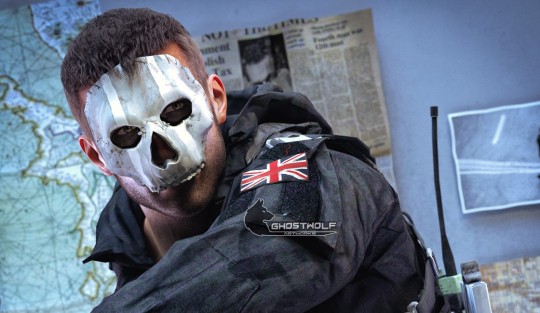
(Thanks to @loneghostwolf for permission to use this image)
What better way to spend your day than outside and at the local market? It was a little later in the day than you expected, but sleeping in is also nice. You were lucky to have a remote job and generally didn't have to deal with office life. This afforded you a lot of leeway when it came to work-life balance, but nothing was better than actual time off to get out and do things for yourself.
The market itself was a great place. Vendors were always swapping out and there were a variety of trinkets, tools, clothing, food and more up for barter. The fact that it also bordered a nearby park helped for escaping the crowded stalls at a moments notice. You hiked your bags up on your shoulder.
What you didn't expect to find at the market was Simon. But there he was, three vendors down in his usual mask, a dark hoodie and jeans, and standing taller than most everyone else around him. He seemed fixated on something you couldn't make out from your position.
Wanting to be sure it was him, and you weren't suffering some visual hallucination, you pull out your phone and send a message
You: Hey Simon! How goes today? What are you up to?
You see him reach in his pocket and pull out his phone.
Simon: It goes. I'm out right now. Simon: Are you looking to meet up again?
You smile as you read his message. Putting your phone back in your pocket, you slowly make your way over to him. You step lightly and walk slowly, hiding behind people as you closed the distance. You were sure you were going to get the drop on him, when he turned around suddenly to face you; his fist pulled back to his side.
His eyes softened as he realized it was just you and he relaxed his fist.
“Hey.” He says in his flat, gravelly voice. “Shouldn't try and sneak up on me, could get hurt.”
“Nah,” You say, waving away his warning. “You'd never hurt me.” You smile.
He looks at you with a furrowed brow.
“Mind if I join you?” You ask. “No pressure.” You add, raising your hands up.
He nods.
“Sure. Just planned to wander, so might be here a while.” He says, returning his attention to the item that had caught his attention.
You crane your head and move around to get a better view of it. Its a multi-tool. It looks old and is rusted, likely not useful for actual use, but if he's focused on it, it means something to him. You take in his interrogation of the tool as he looks it over several times.
“Gonna buy it?” You ask softly.
“Dunno.” He shrugs.
'Always giving away so little.' You think before taking position up beside him. He gives you a side eye, but stays silent.
After a few more minutes of looking over the tool and other wares, he turns and starts to walk away. You pivot on the spot and start walking with him, keeping pace to his longer stride.
Simon briefly stops at a stall selling blankets and gives them a look over, running his hands over the soft fabric and examining the colourful patterns. He looks at you again and simply says, “Not as good as my throw.”
Your heart skips a beat and your soul astral projects around the city before crashing back into your body. Your breath hitches in your throat as you take in the fact that, in his own way, he just gave you a compliment. He liked your throw, and now compared it to every other one he came across. You had no way of hiding your pleased embarrassment as the red spread across your face, but you managed to get out a low, “I'm glad you like my gift.”
“Mmm." He replies without looking at you.
He moves on to the next stall, this one selling a variety of books that must be well out of print. You can smell the earthy, musky aroma of the old pages as you both step up to the stand. Your eyes dart over the selection of old material; the vendor offering a bit of everything from manuals to romance novels to kitschy sci-fi books.
It was only by happenstance that you looked up to see the glimmer in Simon's eye as he also took in the fascinating sight of the selection before him. He reached down and picked up a particularly damaged booklet. The words on the cover were worn mostly off from age, and the spine had clearly seen better days. But you were able to make out a faint image of a series of guns and what looked like the picture of a World War II uniform. You smile warmly, it's very in line with what he seemed interested in.
“You should get it.” You say as you finger the pile of sci-fi books. You grab a few and begin reading the back.
“You think?” Simon asks genuinely.
“Yeah.” You give him an enthusiastic nod. “Would go well with the collection you already have.”
“Hmm.” He ponders the possibility of the purchase.
You can't help but chuckle at some of the synopsis of the books you have and stack them in your arms. You are definitely getting these.
Simon still seems unsure of the booklet, so you reach over and take it gently from his hands and add it to your stack. “We'll take these.” You say as you turn to the elderly woman tending the stand.
She flashes you a crooked smile and quickly tallies the books total.
“That'll be five pound twenty-five.” She says with a hoarse voice. “Need a bag, love?” She inquires as you rummage through your wallet.
“No, thank you.” You smile, handing her the exact change.
You turn back to Simon who simply stares at you as you hand the booklet back to him. “That was unnecessary.” He grunts, though still taking the booklet from your hand.
“You're welcome.” You say, ignoring his comment. You shove the books into one of the bags tucked under your arm, and see that Simon is already heading off to the next table. Though his eyes are still very much on the booklet.
Simon stops in front of a stand selling cured meats and starts placing an order, clearly having been here before. You watch as his mood shifts; he's not quite pleasant, but he's much nicer to the man currently filling several wrappers with a variety of goods.
You stand there quietly as he the friendly man hands over the meats in a bag and Simon pays. You're interest is piqued by his selections, offering a small look into the man who keeps himself well guarded.
“Having a party?” You ask with a hint of cheekiness as he notices you staring.
“Maybe.” He grunts.
“Am I invited?” You say, pressing him.
“No.” He huffs, once again making off for his next destination.
*** + *** ++ *** + *** ++ *** + *** ++ *** + *** ++ *** + *** ++ *** + ***
After a few more stops, he makes his way to a shop that takes you by surprise; soaps and shampoos. You had to admit that he did always smell great, but he didn't seem the type to buy such things in front of people – friends – so carefree.
His eyes tactically scanned the offerings as if looking for something specific. You couldn't resist taking a look as well, picking up a bar of soap labelled 'Nomad.'
“Earthy and adventurous with a smoky note and hint of pine.” You say, reading the label. “Huh...” You take a sniff. “Smells nice!” You smile.
You set it back down and pick up another one; 'Midnight Forest.'
“Deep moss scent with cedarwood, and a touch of herbs.” Again you sniff it. You purse your lips, unconvinced.
Simon's attention is split between his search and your inquisitive exploration of the soap.
“Going to buy one?” He asks.
You shrug, picking up another one.
“Stealth.” You say.
Simon's eyes lock on the bar of soap.
“An invigorating mix of sandalwood, black peppercorn and a citrus zest.”
You see his hand twitching at his side, quickly realizing you found the one he was looking for, but he's too damn prideful to tell you. You smile, and enjoy the moment. You play with the bar of soap, examining it closely. “What do you think, Simon? Should I get this one?”
“Get what you want.” He says with annoyance. You can see he's grinding his teeth.
You look the soap over once more before deciding to put it down, instead you grab a bar of the 'Nomad,' and pay for it. Shoving it in the bag with your books.
“I'll wait for you over there.” You say, pointing to a quiet area where the market thins out.
You walk away before he can respond. As fun as it was to tease him, you decided to give him a little privacy to make his purchase. You understand its just soap to you, but to him its one more glimpse into his private life.
You look at your bag and books and chuckle at the realization you didn't get much of anything, despite the list you had in your head when you arrived. 'Oh well.' you think, you can always come back.
You see Simon make his way towards you with his usual steady, confident pace, he gives you a nod before stopping a few paces in front of you.
“Got everything I need.” He says with his gruff voice, pulling the bags up briefly to show you. “How about you?”
“No...” you admit, shaking your head, “but I can come back tomorrow, its getting late and I should be heading home.”
Simon nods, and jerks his head to the side, a silent signal that he will walk you to the other side of the market. You smile and nod back, once again walking by his side.
“It was good to see you here, Simon.” You say as you two weave through the crowd.
“Yeah.” He says. His voice is so low and soft you almost didn't hear him.
“Want to get together soon?” You inquire as you two reach your parting destination. “Its been a while.” You add.
“Yeah.” His voice still quiet and soft. “Soon.” He speaks up.
“Perfect, message me when you want me to come over. We can do a movie night or something.”
“Sounds good.” He says. He goes to walk away but stops. Simon examines the bags in his hand and then gazes back at you. He lets out a heavy breath. “You live close by, yeah?” He inquires.
You nod. “Yeah... maybe a ten minute walk?”
“Show me.” Simon commands. “Show me where you live.” His voice is low and gravelly.
“OK, wow... that was a bit threatening...” You say, jerking your head back in surprise. “Why do you want to go to my place?” You ask, furrowing your brow.
“You know where I live.” He says flatly. “You've seen my flat. I want to see yours.”
You consider his request as he stares you down. You know you both do and don't have a choice. If you told him no, he would probably respect it... but it risked bucking the relationship you two had. You take a deep breath. 'Fair is fair.' You think.
“Alright, Simon.” You agree. You motion in the direction of your flat with a wave of your hand before taking off, leaving him behind as he did to you earlier.
*** + *** ++ *** + *** ++ *** + *** ++ *** + *** ++ *** + *** ++ *** + ***
The walk to your flat was mostly uneventful. Simon spent a majority of it taking in the sights, sounds and people; likely never having been to this part of town before. Not a big surprise to you, he likely didn't venture far from his flat on the best of days.
“Not a bad place.” Simon mumbles as you both approach the small building.
It was a pretty basic building; ten units per level over four levels. Small balconies dotting across the exterior. A typical grey-black facade blended the building into the rest along the street. Small shrubs and flowers ran the perimeter of the buildings and filled the air with fragrant scents.
You usher him toward the entrance, typing in your code to enter the building. Simon follows strangely close behind you, but you try not to give it too much attention.
As you enter the flat, you gesture to the bag in his hand. “I'll put it in the fridge until you leave.”
He hands the bag over.
“Take a look around.” you say, giving him permission to roam freely.
Simon sets about your place in a tactical manner, following a path he created in his mind the moment he crossed the threshold of your doorway. He passed the kitchen with little interest and made his way to the living room, taking in the more lived-in feeling of the place. Pictures of your family are spread over the wall between paintings of forests and lakes, and children's art. Your TV stand and bookshelves are filled with reading material and figurines and trinkets. The room is overwhelming to him, the feeling of warmth and coziness curated causes his stomach to twist. He turns quickly and makes his was slowly but steadily towards the hallway.
He disappears from view and you let out a relieved sigh that you cleaned the flat. While he explores your bedroom and office, you put the kettle on and start making some tea. You grab some biscuits from the cupboard and plate them, setting them on the table.
You place two mugs on the counter as the kettle starts to whistle. The sounds seems to stir Simon's interest and he makes his way back to the kitchen. You stand there with a mug in hand, tea bag steeping.
“Thought you might stay for a cup?” You ask softly, handing him the hot mug.
He takes the mug from your hand, briefly touching your fingers.
“Have a seat.” You say, your heart jumping a bit at his touch.
You grab you own mug from the counter and take a seat across from Simon. You take a biscuit from the plate and dip it in your tea before taking a chomp out of it. You lean back in your chair and swallow the sweet treat.
“So whats the verdict?” You ask with a bit of playfulness. Its your flat, so you don't have to give a shit about rules one or two here -or any of them really - but especially those two. Your dynamic was changing and the rules were already bending, but being in your flat still gave you a bit more control. A bit more power.
“I can see several security concerns.” Simon replies flatly, moving his mask down to sip his tea. “But I suppose for a civilian, it will do.”
Was he joking?
You raise an eyebrow.
“Homey.” He adds, not looking at you.
“Well... you're welcome to visit any time.” You say.
He lets out a guttural growl.
You just look at him warmly, knowing you're assaulting him with a lot of stimulus. His mind must be working a mile a minute, so you let him think.
You take another drink of you tea. Sometimes just sitting in silence is enough.
#gay#lgbtq#cod#cod mwf2#cod mw2#cod mwii#call of duty#simon riley#ghost#simon riley cod#ghost cod#simon x reader#simon x male#simon riley x male reader#ghost x male#ghost x male reader#ghost x reader#sfw#story#short story#one shot#part five
183 notes
·
View notes
Note
If any of you are interested in making another long behind the scenes yap for one of these characters, might I suggest Eridan? I just really like his design
yo
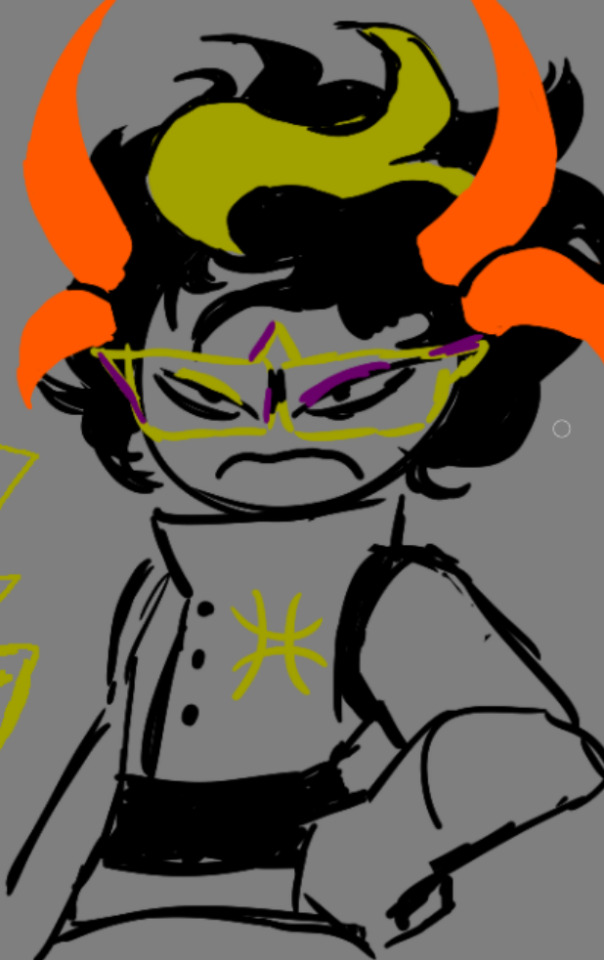
this was the original sketch i had done while we were doing beta troll concept art. his design changed a bit between then and now.
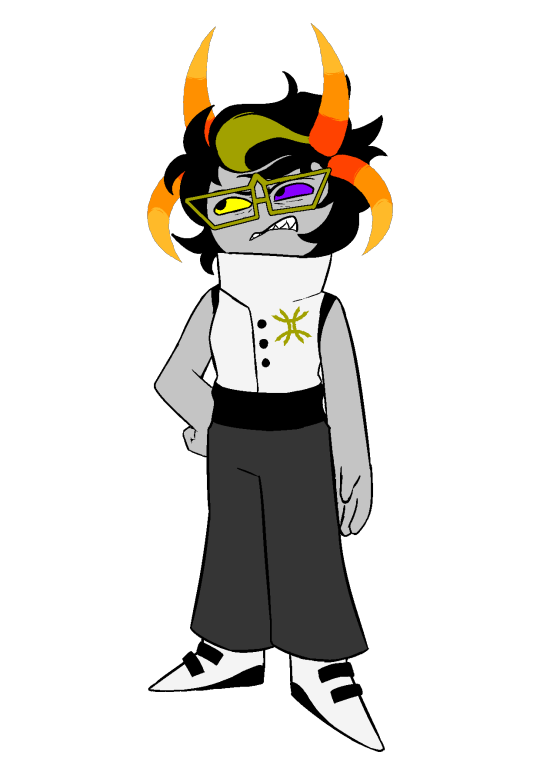
mostly i simplified his stupidly shape glasses to only feature one color instead of two, and decided not to give him bi-color eye shadow. it was just too much going on.
i don't remember the exact design philosophy i had going into Eridan... for most of the beta trolls, i started with the horns, trying to match them with their signs. Gemrius is the Hope+Derse gold sign that he ended up with, so i gave him those weird dual curved horns to match it. (funnily enough, Gemrius looks almost exactly like Pipia, the Derse+Light fuchsia sign. i wonder what horns for that sign would look like?) oh yeah, he also shares his sign with Cirava Hermod. there was bound to be some overlap with a few of those hiveswap trolls. Tyzias and Remele come to mind.
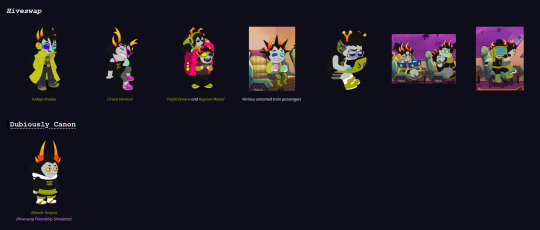
speaking of, i also remember looking at a lot of the hiveswap friendsim trolls while doing the trolls. the wiki has a page for each blood caste and they all have a list of members, so it worked well for getting a good look at the shared traits within each caste. Eridan proved difficult because almost all the golds we know of have those neon color-no pupil eyes. The only exceptions being Zebede and a background troll from the train.
from that i guessed that most golds have that neon eye gene, but not all of them. i'm not sure if it directly correlates to a gold having psionics... but i did take that into account when i gave Eridan the eyes he has.
Eridan doesn't have psionics, but believes that one day he'll unlock them. i gave him these weird neon-with-pupil eyes to visually nod at that. maybe his strange eyes *are* because his powers are latent? or maybe it means nothing and he just has weird freak eyes. either way, he's not shooting lasers out of his eyes anytime soon.
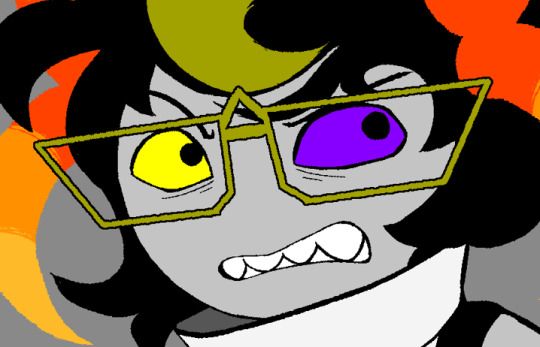
i don't remember what possessed me to give him his silly outfit, just that we didn't want the trolls in the upper end of the lower castes (so Eridan, Feferi, Karkat, and Vriska) to look *too* fancy or colorful. this is 100% the nicest thing he owns. mostly i think i just wanted him to look like he's trying to make you think he's cooler than he actually is.
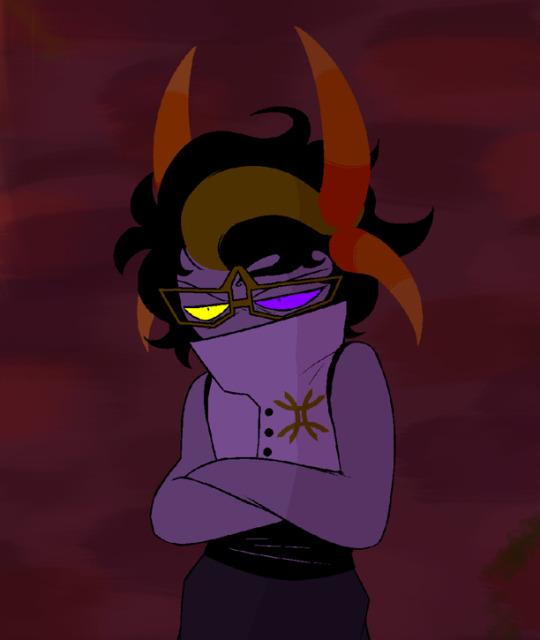
i also can't talk about eridan without mentioning his god awful terrible to look at quirk.
CA: {a wizard's job is to vex c#ummps quickly inn fog;}
look at it. look at this beast on my floor.
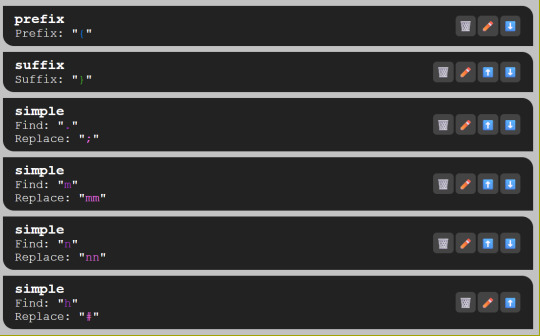
this one was a group effort between us and the discord chat during a stream there. it's his original ww vv but flipped upside-down to be mm nn, H's become # because his sign looks like a #, and he always replaces full-stops with ; because he's never done talking. the reason it's always in {} because someone said, and i quote, "eridan looks like a curly bracket." i think they must've meant his horns???????? the reason he has so much going on is because canon Sollux has so much going on with his quirk.
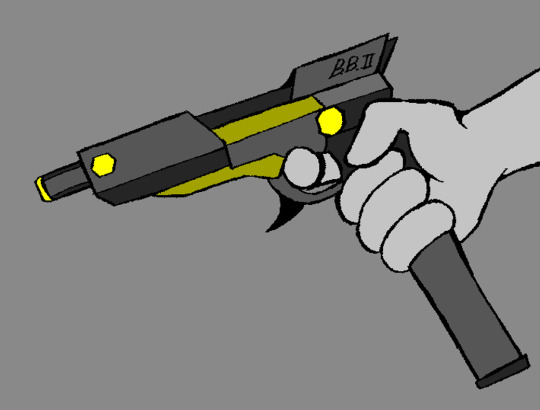
one final design note to give about Eridan is actually about his gun. i called it the B.B. Gun Mk.II, but it's actually just a gun from the anime Symphogear (i couldn't find an image of her *actually using it* from the show, but i was able to find pictures of her goodsmile figure where she has them so just trust me on this).
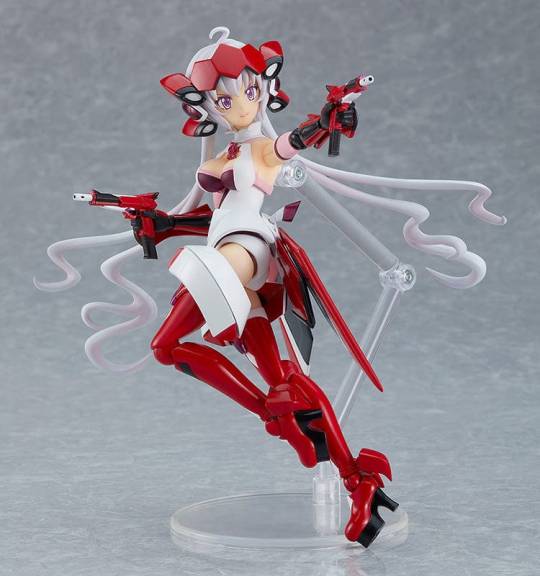
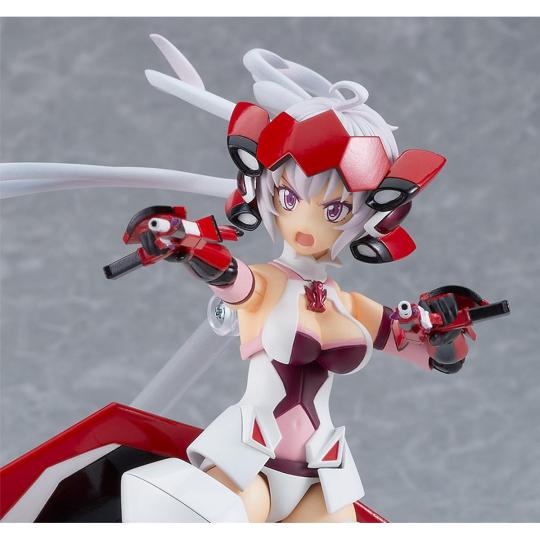
funny enough, this was before i had watched the show, roxy just slid this sick 3d model someone made of it to me as reference and i went "oh boy! anime gun for the anime guy!" i guess he must have alchemized a pistol with some merch of Troll Chris Yukine from Troll Symphogear? i like to think that's a show Eridan and Feferi would both like.
welp, that's all from me on Eridan. i hope this was actually interesting and not just mindnumbing rambling. ^^;
-HCZ
18 notes
·
View notes
Note
WIBTA for telling a fanfic author how much their fanfic meant to me as a teenager?
As a fanfic author, title is not as clear cut as it sounds.
All you need to know about me is I'm 30 now, and I discovered this fanfic at 14.
When I first started discovering fanfiction and fandom, I ended up reading a lot of fic for this one kind of small fandom I'm still in now. When I found the fanfic it was kind of a random search since it didn't even have the characters I was looking for tagged, but I took the chance on it and gave it a read, and ended up hyperfixated on it. I couldn't speak up for the quality of the fanfic nowadays, but to 14 year old me, it was the best thing I could've ever read. I loved it, I loved the characters, I thought it was absolutely amazing. I probably read it ten times over the six months I hyperfixated on it, and it was not a short read.
Now also at age 14, I really wanted to be an aspiring fanfic author as well. And so I did what any neurodivergent teenager does when finding a new hyperfixtion: I wrote myself into the fanfic.
Now I did have some common sense. I knew that rewriting somebody else's fanfic was a big taboo and all, so I deemed it my "writing practice document" and so I spent hours upon hours writing this fanfic just for myself, and then when I moved onto a real fandom hyperfixation, I moved on and stopped writing it and never bothered backing it up, so the story is gone.
And if that was where this begins and ends, it'd be fine. But the thing about this fanfic is that the main character was a self insert (the author said as much.) This meant that I ended up accidentally in a parasocial relationship with an author who only knew I existed because of a single review I left without even having an account on the website. Because I wrote their self insert and my self insert as best friends. And while logically at the time I knew my version of events for the fic were just that, my version of the story, I'd convinced myself that we were going to actually become bffs. This was especially bad because I didn't really have a lot of friends in high school, and so I really, really wanted this fictional friendship with the author's self insert to become real.
Anyways like I said, got into real fandoms, moved on from the awkward parasocial relationship, and the fanfic ended up becoming just a fond memory of mine to occasionally revisit.
Until today. I was looking up images of the canon characters on google for a powerpoint I'm working on and a piece of fanart popped up in the recommended featuring their version of the characters. (And yes, their version is visually distinct enough to be immediately identified despite me having never found their art before this moment.) I was startled, and realized that I'd found their account on another site.
Despite the fic being ancient at this point, I really do want to reach out to tell them how important their fic was. Even if they don't know how or why, I know somebody messaging me something like that would absolutely make my night. But the issue is is that obviously like...there's a lot of baggage here. I formed a parasocial relationship with a fanfic author and rewrote their fic for myself and while I wouldn't mention it to them I do feel like maybe because of the level of degree I obsessed with this fic it probably wouldn't be the smartest idea and idk, it could probably make them a bit uncomfortable to have somebody show up in the inbox of an account where they didn't post the fanfic saying "Hey so back when I was a kid I read your fanfic and absolutely loved it" as well. But the site they posted the fanfic on is definitely barely functioning now adays well enough for me to message them about loving the fic there since I doubt anybody even still uses it.
So tumblr, WIBTA?
8 notes
·
View notes